QNAP Qu405, Qu605 and Qu805 NAS Coming Soon for Home and SMB Users
QNAP has officially launched the QuX05 series in the Eastern market, introducing three new desktop NAS systems: the Qu405 (4-bay), Qu605 (6-bay), and Qu805 (8-bay). Designed to refresh QNAP’s mid-range portfolio, these models target home users seeking centralised storage, creative professionals handling large-scale multimedia, and small to medium-sized businesses in need of reliable file servers with room to grow. Hardware configurations are offered in two processor options, with the Intel Core 3 N355 eight-core chip running up to 3.9 GHz for higher performance workloads, and the Intel N150 quad-core option at up to 3.6 GHz for cost-conscious deployments. All units adopt DDR5 memory, available in 8 GB or 16 GB SKUs, with support capped at 16 GB via a single slot, which while modest, still provides a step up in bandwidth over DDR4 used in older NAS systems. Storage capacity scales with the number of bays, from four in the Qu405 to eight in the Qu805, and each model also includes two M.2 PCIe Gen3 slots that can be assigned for cache acceleration or used as part of the storage pool. Connectivity has been modernised with dual 2.5GbE ports supporting SMB Multichannel and Port Trunking, USB 3.2 Gen2 across Type-A and Type-C, and a dedicated HDMI output capable of 4K60 playback or VM projection, ensuring these systems can function as both storage appliances and multimedia platforms.
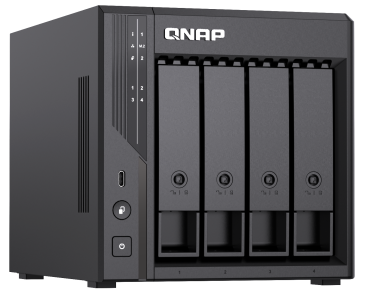 |
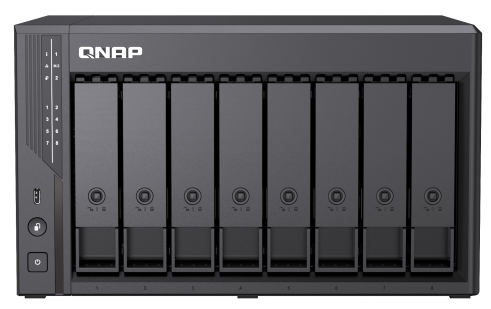 |
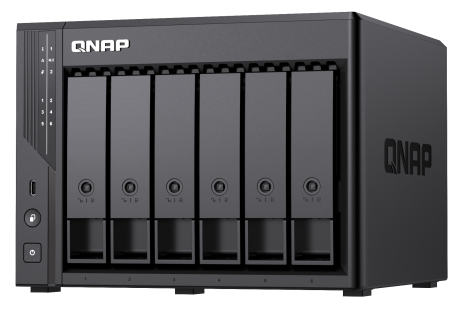 |
The QuX05 series also benefits from QNAP’s dual operating system approach, allowing users to deploy either the established QTS software environment or the QuTS hero ZFS-based platform for improved data protection, inline deduplication, and snapshot functionality. Integrated AI-powered tools such as QuMagie for photo organisation, Qsirch for semantic search, and Qfiling for automated archiving further extend the usability of the series, making it suitable for both consumer and business applications. The timing of this release is notable, as QNAP’s TS-x64 and TS-x53E systems, including the TS-264, TS-464, and TS-664, are now over three years old, and while still supported, they increasingly feel dated in comparison to more recent offerings. At the same time, competition has intensified with new entrants such as UGREEN, Minisforum and Aoostar, which has gained traction in the NAS sector with aggressive pricing and updated hardware designs, underlining the demand for innovation. Against this backdrop, the Qu405, Qu605, and Qu805 arrive as QNAP’s latest response, bringing updated architecture, refined airflow and thermal design, modernised connectivity, and versatile system features to a market that is both more competitive and more demanding than before.
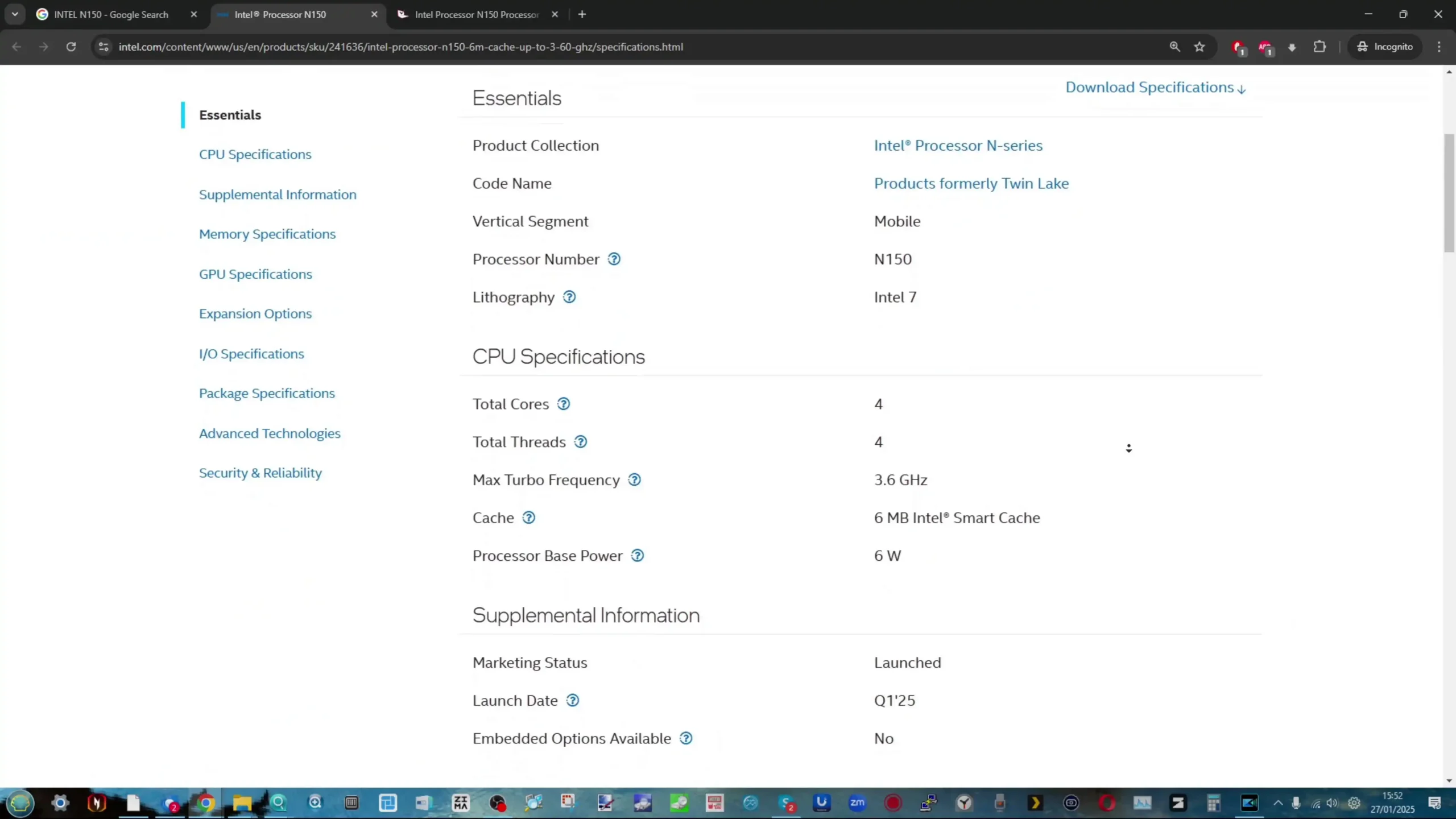 |
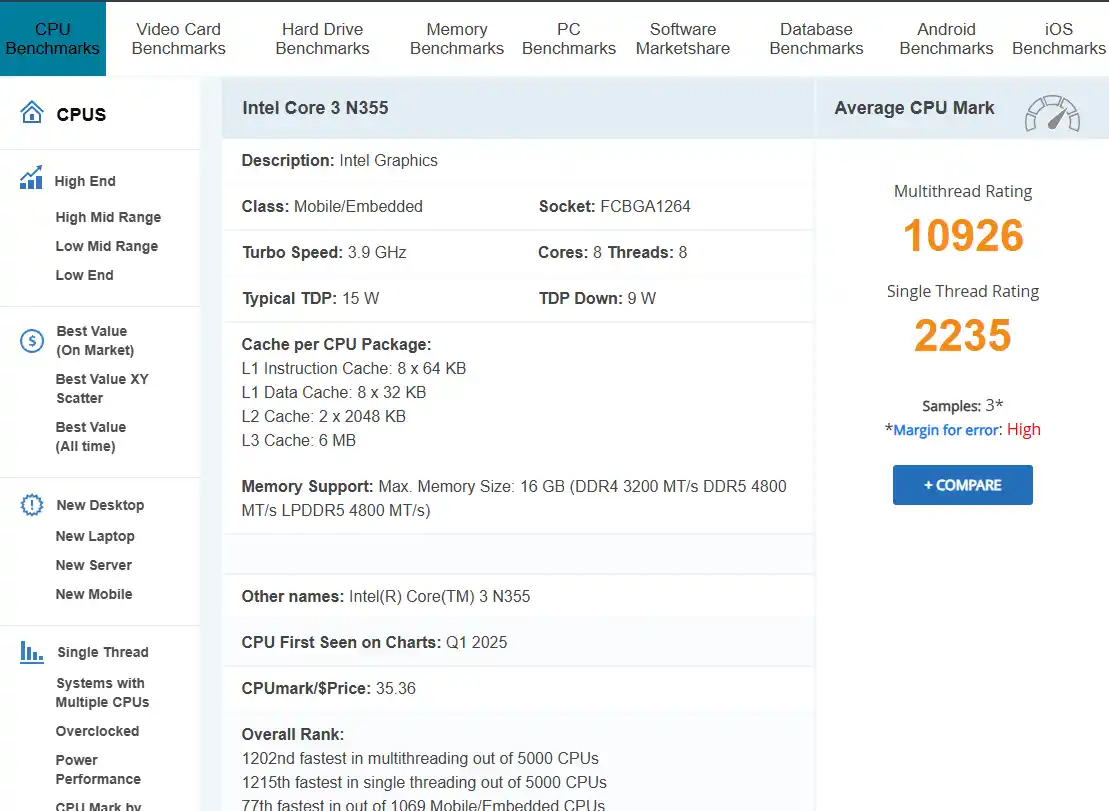 |
QNAP Qu405, Qu605 and Qu805 NAS Hardware Specifications
The Qu405, Qu605, and Qu805 are built around the latest Intel processors, with each model available in two distinct variants. The high-performance option uses the Intel Core 3 N355, an eight-core processor with a maximum turbo frequency of 3.9 GHz, paired with Intel UHD Graphics supporting 32 execution units. This CPU is part of Intel’s Twin Lake platform and offers a modest set of PCIe Gen3 lanes, sufficient for supporting dual 2.5GbE controllers, two M.2 NVMe slots, and other onboard I/O. The Lite models, intended for users with lighter requirements or stricter budgets, adopt the Intel N150 quad-core processor running at up to 3.6 GHz, paired with a reduced integrated graphics configuration and fewer available PCIe lanes overall. Both CPU options support AES-NI hardware-accelerated encryption, ensuring data security is handled with minimal performance impact, while the choice between N355 and N150 provides a balance between performance scaling and affordability across the QuX05 range.
| Model | Qu405
|
Qu605
|
Qu805
|
|---|---|---|---|
| Drive Bays | 4 × 3.5″ SATA (hot-swappable, also supports 2.5″ SATA SSDs) | 6 × 3.5″ SATA (hot-swappable, also supports 2.5″ SATA SSDs) | 8 × 3.5″ SATA (hot-swappable, also supports 2.5″ SATA SSDs) |
| M.2 Slots | 2 × M.2 2280 NVMe PCIe Gen3 ×1 | 2 × M.2 2280 NVMe PCIe Gen3 ×1 | 2 × M.2 2280 NVMe PCIe Gen3 ×1 |
| CPU Options | Intel® Core™ 3 N355 (8-core, up to 3.9 GHz) or Intel® N150 (4-core, 3.6 GHz) | Intel® Core™ 3 N355 (8-core, up to 3.9 GHz) or Intel® N150 (4-core, 3.6 GHz) | Intel® Core™ 3 N355 (8-core, up to 3.9 GHz) or Intel® N150 (4-core, 3.6 GHz) |
| Graphics | Intel UHD Graphics (32 EU for N355, reduced EU for N150) | Intel UHD Graphics (32 EU for N355, reduced EU for N150) | Intel UHD Graphics (32 EU for N355, reduced EU for N150) |
| Memory | DDR5 SODIMM: 8 GB or 16 GB (1 slot, max 16 GB) | DDR5 SODIMM: 8 GB or 16 GB (1 slot, max 16 GB) | DDR5 SODIMM: 8 GB or 16 GB (1 slot, max 16 GB) |
| Flash | 8 GB eMMC NAND | 8 GB eMMC NAND | 8 GB eMMC NAND |
| Networking | 2 × 2.5 GbE RJ45 (supports SMB Multichannel, Link Aggregation) | 2 × 2.5 GbE RJ45 (supports SMB Multichannel, Link Aggregation) | 2 × 2.5 GbE RJ45 (supports SMB Multichannel, Link Aggregation) |
| USB Ports | 1 × USB 3.2 Gen2 Type-C (front, one-touch copy) + 2 × USB 3.2 Gen2 Type-A (rear) | 1 × USB 3.2 Gen2 Type-C (front, one-touch copy) + 2 × USB 3.2 Gen2 Type-A (rear) | 1 × USB 3.2 Gen2 Type-C (front, one-touch copy) + 2 × USB 3.2 Gen2 Type-A (rear) |
| HDMI | 1 × HDMI (2.0 or 2.1 depending on SKU, up to 4K 60 Hz) | 1 × HDMI (2.0 or 2.1 depending on SKU, up to 4K 60 Hz) | 1 × HDMI (2.0 or 2.1 depending on SKU, up to 4K 60 Hz) |
| Cooling | Redesigned airflow with improved heat dissipation | Redesigned airflow with improved heat dissipation | Redesigned airflow with improved heat dissipation |
| Power Supply | 96 W external adapter, typical ~63 W under load | 120 W external adapter, typical ~84 W under load | 150 W external adapter, typical ~103 W under load |
| Dimensions | 165 × 217 × 168 mm | 165 × 217 × 226 mm | 165 × 217 × 285 mm |
| Weight | Net 2.15 kg / Gross 4.1 kg | Net 2.52 kg / Gross 4.82 kg | Net 3.1 kg / Gross 5.7 kg |
| Operating System | QTS or QuTS hero (ZFS-based, supports inline deduplication, compression, snapshots) | QTS or QuTS hero (ZFS-based, supports inline deduplication, compression, snapshots) | QTS or QuTS hero (ZFS-based, supports inline deduplication, compression, snapshots) |
| Other Features | AES-NI encryption, hot-swap support, RAID protection, QuFirewall, 2FA, Malware Remover, Qsirch/Qfiling AI search, QuMagie photo AI, QVR Pro with 8 free camera channels | Same as Qu405 | Same as Qu405 |
| Ports Image | 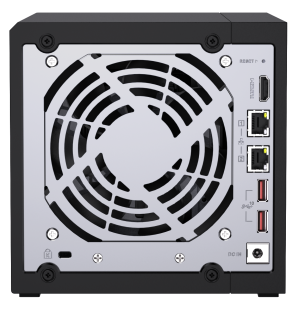 |
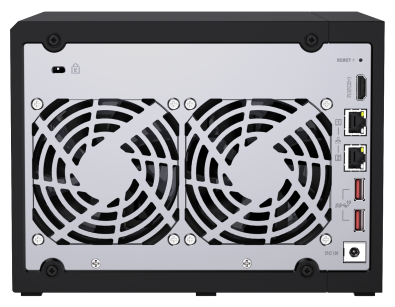 |
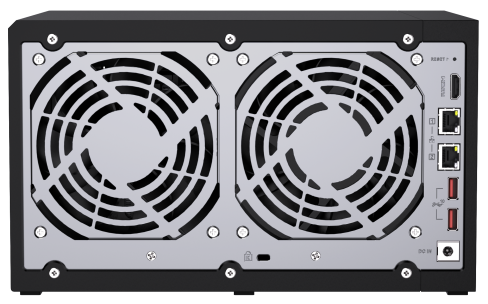 |
Memory is standardised across the series, with all three devices supporting DDR5 SODIMM modules operating at up to 4800 MHz. SKUs are available with either 8 GB or 16 GB preinstalled, and although only a single memory slot is provided, limiting maximum capacity to 16 GB, the use of DDR5 brings notable improvements in throughput and responsiveness compared to the DDR4 used in older generations. The memory arrangement also highlights the target audience of the QuX05 series: home and SMB users who need fast but manageable workloads rather than large-scale enterprise deployments that require extensive memory pools. The systems also include 8 GB of onboard eMMC NAND for essential system functions, ensuring that firmware and OS-level features remain responsive even during heavy storage activity. Unlike some higher-end SMB-focused NAS devices, there is no dedicated PCIe expansion slot for upgrades such as 10GbE, HBAs, or GPU cards. This omission is likely linked to the reduced lane count of the N150 and N355 processors, which restricts available bandwidth for add-in cards. Instead, QNAP has chosen to distribute available lanes across built-in features such as dual 2.5GbE ports and dual NVMe slots, a trade-off that prioritises out-of-the-box functionality over modular expansion.
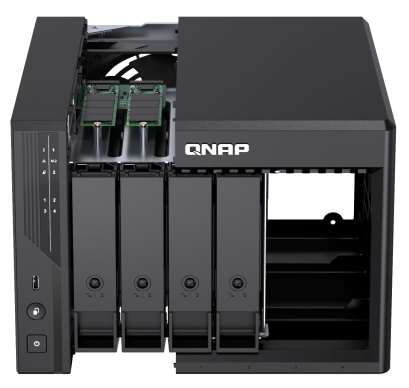 |
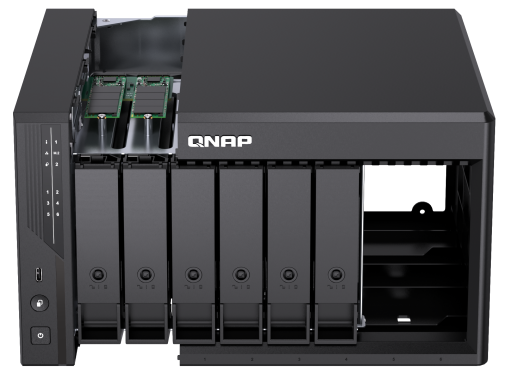 |
 |
Storage options are one of the main areas where the QuX05 series differentiates itself by bay count. The Qu405 provides four 3.5-inch SATA bays, the Qu605 six, and the Qu805 eight, with each also capable of accommodating 2.5-inch SATA SSDs for flexible configurations. All bays support hot-swapping, allowing drives to be replaced without shutting down the system. Alongside the main drive bays, every model includes two M.2 2280 NVMe slots running at PCIe Gen3 x1. While not offering the bandwidth of Gen3 x4 or Gen4, these slots are sufficient for cache acceleration or tiered storage, with QNAP’s Qtier software automatically balancing frequently accessed files between SSDs and hard drives. This approach provides both capacity and performance, especially for environments that mix multimedia storage with frequent small file access.
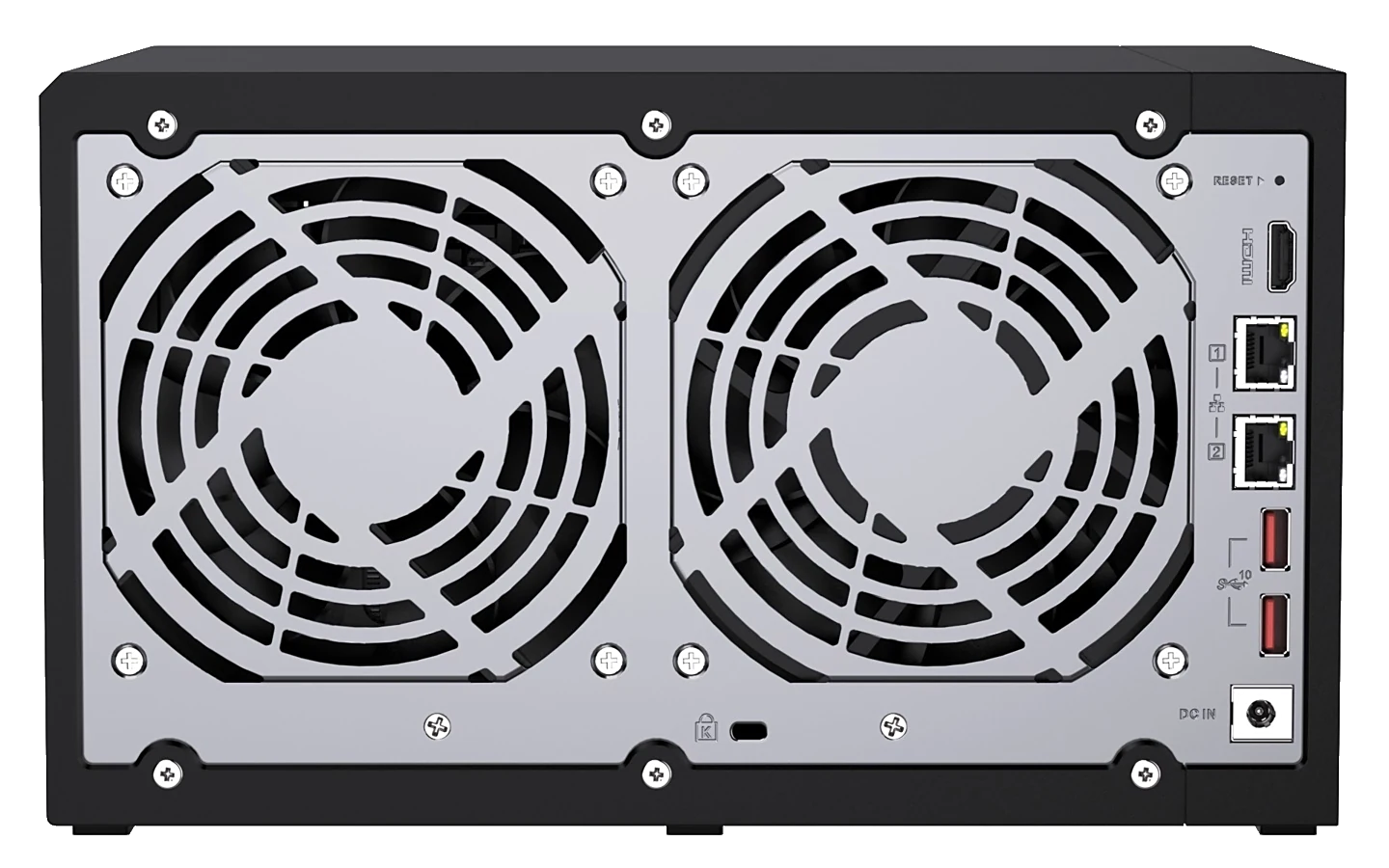
Connectivity is consistent across all three models. Networking is based on dual 2.5GbE RJ45 ports, supporting link aggregation for bandwidth scaling and redundancy as well as SMB Multichannel for improved multi-session performance. Local I/O includes two USB 3.2 Gen2 Type-A ports at the rear, a front-facing USB 3.2 Gen2 Type-C port with one-touch copy, and HDMI output capable of 4K at 60 Hz. Most SKUs list HDMI 2.1, while some Lite versions list HDMI 2.0, so capabilities vary depending on configuration. Power requirements scale with chassis size, from a 96 W adapter for the Qu405, to 120 W for the Qu605, and 150 W for the Qu805, with reported average consumption under full drive load measured at approximately 63 W, 84 W, and 103 W respectively. Additional features include system buzzers for hardware alerts, Kensington lock slots for physical security, and redesigned airflow systems that improve cooling efficiency compared to older QNAP mid-range hardware. Together, these specifications establish the QuX05 series as a modernised platform that balances capacity, performance, and power efficiency across three scalable sizes.
Comparison Between the QuX05 Series and TS-x64 & TS-x53E Series
The arrival of the QuX05 range marks a generational update in QNAP’s mid-tier NAS catalog, directly inviting comparison with the company’s established TS-x64 series (TS-264, TS-464, TS-664) and the TS-x53E line (TS-253E, TS-453E). While the older models remain capable and still receive firmware updates, they are now over three years old and show their age in several areas. The TS-x64 units rely on Intel Celeron N5095/N5105 processors, DDR4 memory, and single 1GbE networking as standard, with expansion slots required for faster networking or NVMe storage. The TS-x53E series, launched in 2022, provided an alternative path with dual 2.5GbE ports and built-in M.2 NVMe slots, though they were capped at DDR4 memory and lacked PCIe upgrade slots, restricting long-term flexibility. In contrast, the QuX05 systems use Intel’s newer N355 and N150 processors, move to DDR5 memory, and integrate features such as dual 2.5GbE, NVMe SSD caching, and HDMI 4K output directly into the base platform, reducing the reliance on add-in cards or optional upgrades.
Another major distinction lies in how QNAP has approached expandability. The TS-x64 devices maintain a traditional PCIe slot for upgrades such as 10GbE networking or storage accelerators, something absent from both the QuX05 and TS-x53E series. In the QuX05 range, the limited PCIe lanes of the chosen Intel processors have been redistributed to provide onboard dual NVMe slots and dual 2.5GbE networking, effectively prioritising out-of-the-box functionality over modular expansion. For many home users and SMBs, this built-in approach is practical, but for environments needing high-speed networking or specialised PCIe hardware, the TS-x64 remains more adaptable. Overall, the QuX05 line represents QNAP’s attempt to modernise its mainstream desktop NAS range by integrating features previously seen only in higher-end or expansion-reliant models, offering a balance of performance, efficiency, and simplified setup against the backdrop of older but more expandable TS systems.
| Feature / Model | QuX05 Series (Qu405 / Qu605 / Qu805)
|
TS-x64 Series (TS-264 / TS-464 / TS-664)
|
TS-x53E Series (TS-253E / TS-453E)
|
|---|---|---|---|
| CPU | Intel Core 3 N355 (8-core, up to 3.9 GHz) or N150 (4-core, up to 3.6 GHz) | Intel Celeron N5095/N5105 (4-core, up to 2.9 GHz) | Intel Celeron J6412 (4-core, up to 2.6 GHz) |
| Memory | DDR5 SODIMM, 8 GB or 16 GB, single slot (max 16 GB) | DDR4 SODIMM, up to 16 GB (dual-slot) | 8 GB DDR4 onboard, not expandable |
| Network Interfaces | Dual 2.5 GbE built-in with SMB Multichannel and Port Trunking | Single 1 GbE standard, PCIe upgrade needed for 2.5/10 GbE | Dual 2.5 GbE built-in |
| Drive Bays (SATA 3.5″) | Qu405:4 | Qu605:6 | Qu805:8, hot-swappable |
| M.2 NVMe Slots | 2 × M.2 PCIe Gen3 x1 slots built-in | Requires optional PCIe card | 2 × M.2 PCIe Gen3 x2 built-in |
| Ports |  |
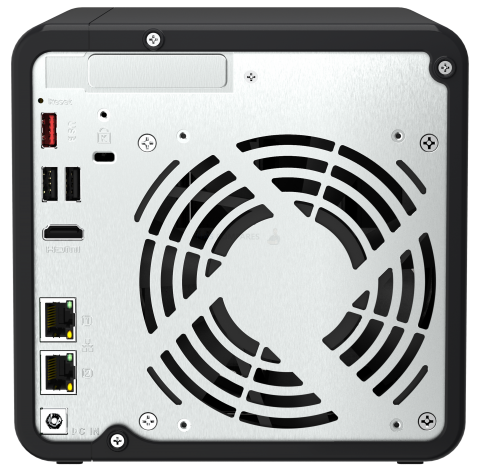 |
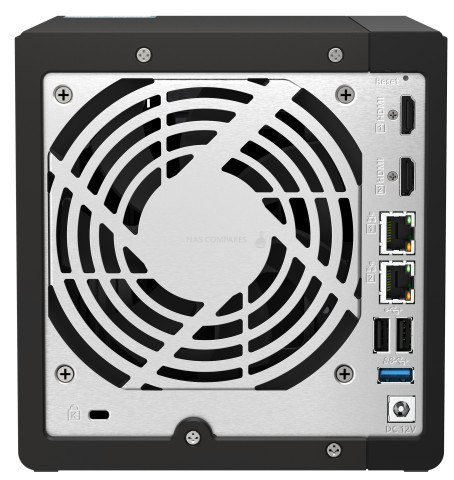 |
| PCIe Expansion Slot | None (lanes redirected to onboard features) | 1 PCIe slot for network/storage cards | None |
| USB Connectivity | USB 3.2 Gen2: 1 front Type-C (one-touch), 2 rear Type-A | USB 3.2 Gen1 ports, front/rear, no one-touch copy | USB 3.2 Gen2 Type-A ports |
| HDMI Output | HDMI 2.0/2.1, 4K60 depending on SKU | HDMI 2.0 or none (model dependent) | Dual HDMI 1.4b, 4K30 |
| Cooling / Design | Redesigned airflow and thermal efficiency | Traditional chassis design | Traditional chassis design |
| Power Consumption (Typical) | Qu405 ~63 W; Qu605 ~84 W; Qu805 ~103 W (fully populated) | TS-464 ~44 W, TS-664 ~70 W (approximate) | TS-453E ~36 W typical |
QNAP Qu405, Qu605 and Qu805 NAS
Early reports from Eastern markets suggest that QNAP intends to position the QuX05 series at a highly competitive level, targeting the same price bracket traditionally occupied by mid-range consumer and SMB NAS devices. Instead of focusing on premium pricing, QNAP appears to be bundling enterprise-class features such as DDR5 memory, dual 2.5GbE connectivity, and built-in NVMe caching into systems expected to fall within the reach of prosumers and small studios. This approach contrasts with past strategies where certain features were locked behind higher-end models or optional expansion cards. The Qu405 and Qu605 are anticipated to scale more affordably due to their lower bay counts, while the Qu805 represents the higher-capacity option. All systems ship with QNAP’s standard two-year warranty, with the option to extend coverage to five years, which remains an important consideration for business users seeking predictable long-term support. Early indications also point to launch bundles or promotional packages, including potential accessories or service benefits, underlining QNAP’s intention to add value in a market that has become crowded with alternatives from newer NAS vendors.
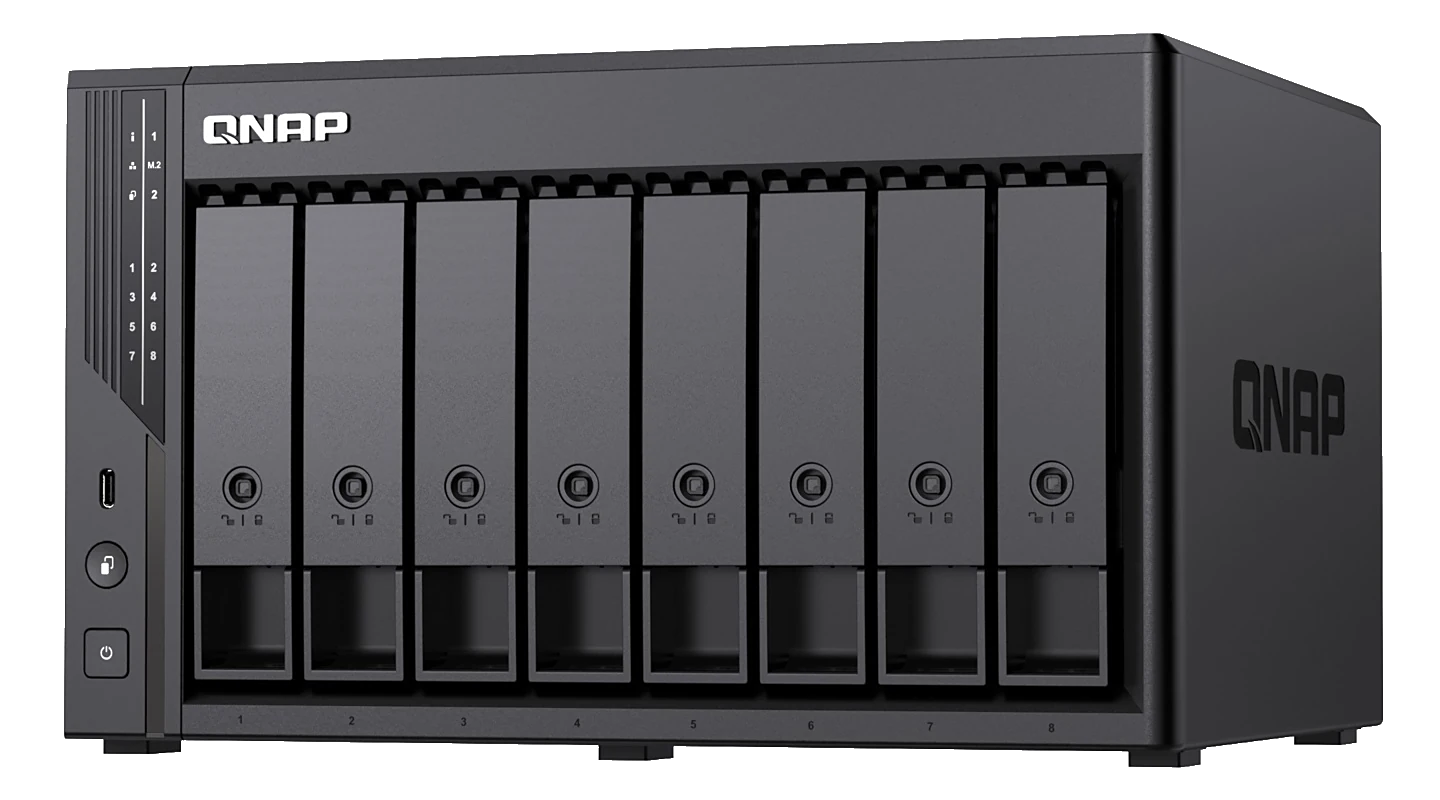
In terms of release timing, the Qu405, Qu605, and Qu805 have already been introduced to the Eastern region, with wider international distribution expected before the close of 2025. Based on QNAP’s established release cycle, this typically means North American and European availability will follow within one or two months of the initial rollout. The timing reflects both market demand and competitive pressure, as the TS-x64 and TS-x53E families are now over three years old, and users have been increasingly vocal about the need for refreshed hardware. With rival solutions from UGREEN, Asustor, and other consumer-oriented NAS makers gaining attention, QNAP’s scheduling suggests an urgency to reassert its role in the mainstream NAS segment. The QuX05 series therefore not only modernises QNAP’s desktop lineup but also aims to arrive quickly enough to counter competing releases, ensuring it remains a viable choice for prosumers, creative teams, and small business deployments into 2026 and beyond.
| Feature / Model | QuX05 Series (Qu405 / Qu605 / Qu805)
|
TS-x64 Series (TS-264 / TS-464 / TS-664)
|
TS-x53E Series (TS-253E / TS-453E)
|
|---|---|---|---|
| Check Amazon |  |
 |
 |
| Check AliExpress |  |
 |
 |
| Check B&H |  |
 |
 |
📧 SUBSCRIBE TO OUR NEWSLETTER 🔔
🔒 Join Inner Circle
Get an alert every time something gets added to this specific article!
This description contains links to Amazon. These links will take you to some of the products mentioned in today's content. As an Amazon Associate, I earn from qualifying purchases. Visit the NASCompares Deal Finder to find the best place to buy this device in your region, based on Service, Support and Reputation - Just Search for your NAS Drive in the Box Below
Need Advice on Data Storage from an Expert?
Finally, for free advice about your setup, just leave a message in the comments below here at NASCompares.com and we will get back to you. Need Help?
Where possible (and where appropriate) please provide as much information about your requirements, as then I can arrange the best answer and solution to your needs. Do not worry about your e-mail address being required, it will NOT be used in a mailing list and will NOT be used in any way other than to respond to your enquiry.
Need Help?
Where possible (and where appropriate) please provide as much information about your requirements, as then I can arrange the best answer and solution to your needs. Do not worry about your e-mail address being required, it will NOT be used in a mailing list and will NOT be used in any way other than to respond to your enquiry.

|
 |
| Where to Buy a Product | |||
|
|
    
|

|
VISIT RETAILER ➤ |
 |
    
|

|
VISIT RETAILER ➤ |
We use affiliate links on the blog allowing NAScompares information and advice service to be free of charge to you. Anything you purchase on the day you click on our links will generate a small commission which is used to run the website. Here is a link for Amazon and B&H. You can also get me a ☕ Ko-fi or old school Paypal. Thanks! To find out more about how to support this advice service check HERE
What IS the Digiera OmniCore NAS? Is it Worth $599?
New UGREEN NAS Expansion, DXP4800 PRO NAS and eGPU Revealed
Gl.iNet Flint 4 10G+2.5G Router Revealed @CES 2026
EVERYTHING NEW from Minisforum @ CES 2026
Gl.iNet Slate 7 PRO Travel Router (and Beryl 7) REVEALED
Minisforum N5 MAX NAS - 16C/32T, 128GB 8000MT RAM, 5xSATA, 5x M.2, 2x10GbE and MORE
Access content via Patreon or KO-FI
Discover more from NAS Compares
Subscribe to get the latest posts sent to your email.


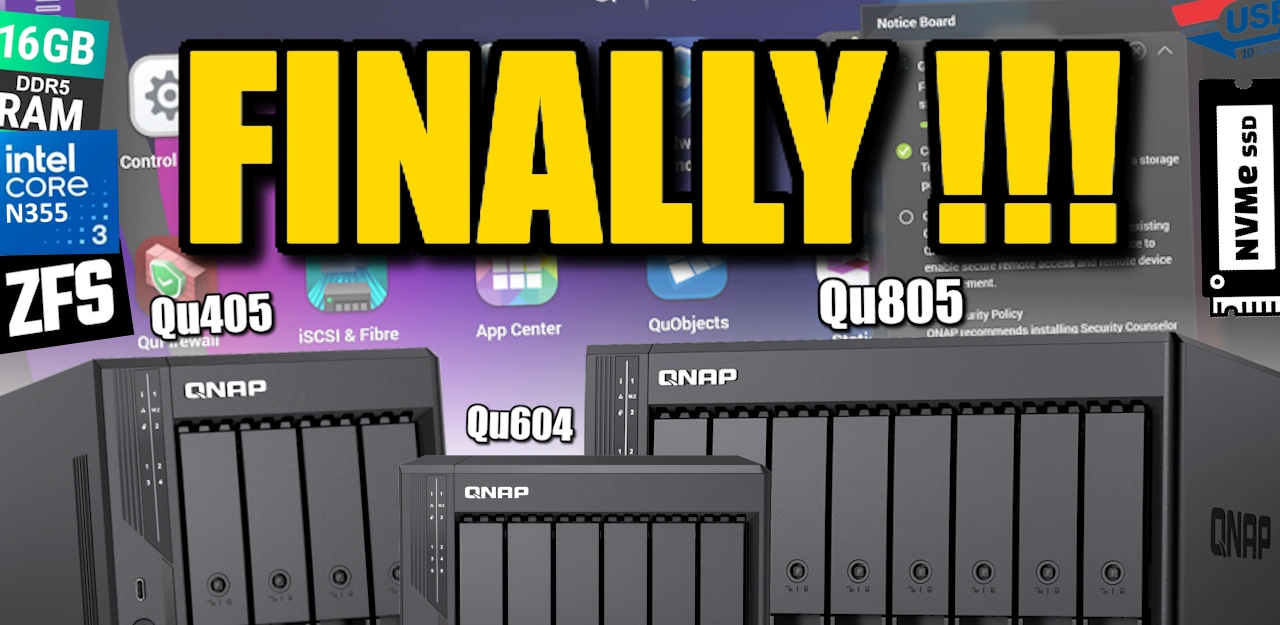
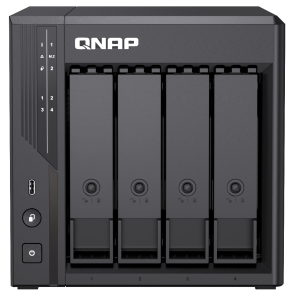
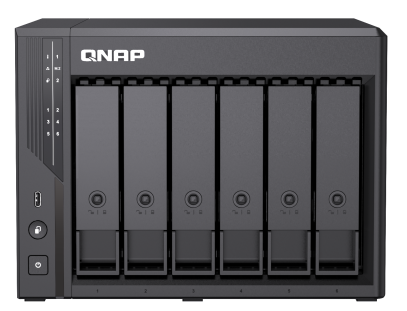
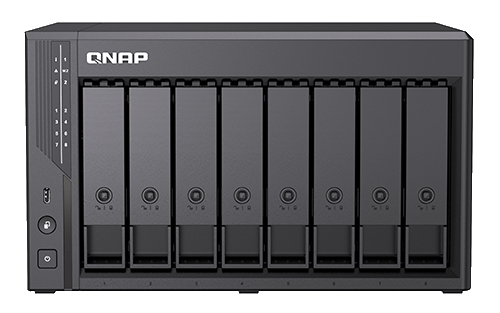
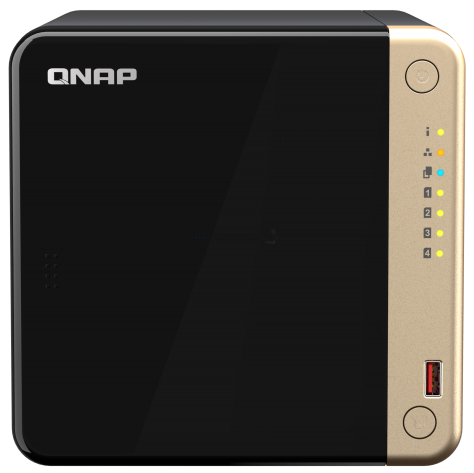
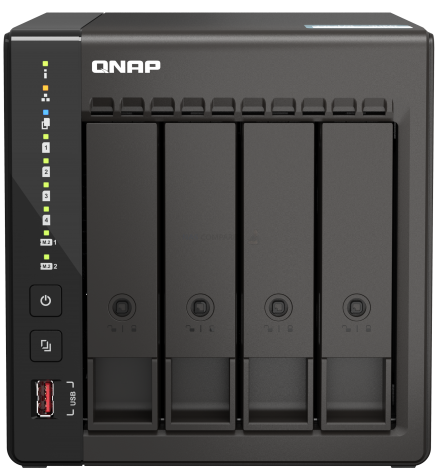



I have used Synology for years. About two years ago, I stopped using them, I’ll never go back. They’re even worse now than they ever were. I switched over to QNAP. I’ve always liked QNAP as well because I have also used them in the past. It’s QNAP for me going forward for as long as they remain as good as they are right now. Don’t care about all these other offbrands. Even if they’re good for what they are, they don’t have the experience or history that QNAP does in the NAS market. I don’t think there’s a need to step down to those brands. Especially considering some of them are just as expensive as a QNAP or Synology.
REPLY ON YOUTUBE
You are a great communicator, thanks for the video!
REPLY ON YOUTUBE
Yep – looked at TrueNAS several times but always stayed with OpenMediaVault – it does what I need
REPLY ON YOUTUBE
Sponsored by Synology?
Come on, the brand is not as good and the other ones aren’t as bad as inferred on this video.
REPLY ON YOUTUBE
I just did my own comparison between UGREEN DXP6800 and my QNAP TS-673a and I am sending the UGREEN back. It took 2 1/2 days to sync 6, 18TB drives in a RAID5 volume and once I started writing data to it, it would average about 600MBPS compared to the QNAP with the same drives but in ZFS and it would average 850MBPS write speeds across a 10gbe connection. Plus the UGREEN lacks volume encryption, which I need for another off site backup. The hardware specs look good but the actual performance wasn’t there for large volumes of data.
REPLY ON YOUTUBE
I wish I had watched this video before I bought into the Ugreen hype. Even now it’s undercooked to say the least. It’s still missing a lot of features. I tried TrueNAS for a while on the hardware but like you mentioned it’s not exactly intuitive to use and requires time and effort. I don’t require a lot from my setup, just something reliable and easy to use. If not turnkey at least as close to it as I can get after I set it up. Ugreen is not hard to set up, but it’s so rudimentary that I end up faffing about trying to get things I want to work, like backing up to BackBlaze B2.
REPLY ON YOUTUBE
I wont purchase a QNAP NAS without PCIe slot and 1 slot RAM. The only reason I buy/upgrade QNAP NAS is the joy of tweaking it, otherwise there are many cheap NASes with much more flexibility.
REPLY ON YOUTUBE
Read ugreen user agreement, mostly you need to kneel to China
REPLY ON YOUTUBE
In china QNAP Qu405 cost 700$ and QNAP Qu805 cost 800$. Do you think is worth it?
REPLY ON YOUTUBE
Really annoying with earbuds to have one talking in your left ear and the other in the right.
REPLY ON YOUTUBE
My next NAS would not be a Synology.
REPLY ON YOUTUBE
when it will be available in the market?
REPLY ON YOUTUBE
Yes, Truenas is complicated, but if your server is running, it’s running. There’s no cost in terms of money, advanced tools, or containers, but it’s not made for users who want a plug-and-play system. I also have to say that it’s more difficult to learn how to back up my QNAP NAS using the working FTP connection to my Truenas server than it is to set up an FTP service with the help of a Truenas tutorial.
REPLY ON YOUTUBE
Is there a 2 bay option (Qu205) coming out?
Software versus hardware… Business versus Soho… Synologoly / QNAP…. Terramaster/Ugreen
REPLY ON YOUTUBE
Thank you for your honesty. Totally agree. Leaving Synology because of some hard drive locking (which is now a thing of the past since there are hacks) is a mistake. IN the end it just depends on what you need. If you using Synology just for backup, you are under-utilizing your product. You might want to take another Nas.
REPLY ON YOUTUBE
I’m planning on going from a DS218Play 2x WD Red, all the way to a RS1221+ 6x EXOS (for now) with E10M20-T1.
Yes the hardware is overpriced, and yes i can make my own with TrueNAS or HexOS or something similar…
But i want my homelab to just work, and SHR being able to mix and match drive sizes… thats why i tend to get a new Synology.
Ugreen does look tempting, as does Ubiquiti, but they are to new for me to consider them, i prefer the good old reliable, tried and true solutions.
I’m a sys-/server admin at work, and i don’t want a 2nd 9-5 when i get home, if something went wrong.
And no, i won’t use QuickConnect, DS File/Drive/Etc… i’ll just mount it to proxmox, and pass it on to my LXC containers for Jellyfin, NextCloud, Immich, FileFlows, *arr, PBS and redirect from NPM to DSM manually.
REPLY ON YOUTUBE
Was stoked, they finally released something that was not 2022 gear with a 2020 processor.
The real killer for me, compared to my older TS-453Be is….They seem to have killed QVR pro with 8 free channels.
On This one they will only do 2 free channels and then i have to pay an additional $70 for each extra channel.
I have 8 camera’s so that’s 6 licenses to supplement the 2 i have, so i will have to shell out another $420 on top of the price of the NAS and when i want to upgrade the NAS, these licenses can not be transferred.
So i have to pay, maybe an extra 50% on top of the price of the NAS to allow me to use it like the old one, which is absolutely out of the question.
I think i will just have to abandon QNAP and buy one of those ITX boards a fitting NAS case and then run opennas on that and supplement it with frigate for camera surveillance instead of QNAPS insanely expensive stuff.
REPLY ON YOUTUBE
No pcie slot to support low profile gpus is a deal breaker.
REPLY ON YOUTUBE
Purchasing a 6 bay NAS to replace my aging PC/Windows based server with 4 bay DAS (WD RED 10TB x 4). Running Plex and a few other tasks that can be done via Docker or a VM. Plan to use Unraid but don’t want to go fully DIY. What do you think between the Ugreen DXP 6800 Pro vs the QNAP TS-664-8G vs waiting for the new QNAP Qu605? Is it even coming to the US?
REPLY ON YOUTUBE
Do these pass the ds925+
REPLY ON YOUTUBE
This series is for China only per Qnap Poland. This is not going to be sold globally
REPLY ON YOUTUBE
Is 5Gb Ethernet even practical for the average home user? I mean, my 2,5Gb Switches (Netgear MS305 and MS308) were affordable, but still 10 times the price of a 1Gb equivalent and 5Gb Switches are still pretty expensive, especially when it comes to 8x 5Gb ports…
REPLY ON YOUTUBE
Do they plan to release a 2-bay model in that series to replace the TS-264?
REPLY ON YOUTUBE
QNAP is so after the competition now.
REPLY ON YOUTUBE
You need 2 slots with 16GB each (cos ZFS), otherwise it’s not worth spending time on this box.
Overall, it’s weak and cut down on hardware.
I just hope this is not the new 464 version. Because if this is the new 464 then it’s better to give up and forget about QNAP.
REPLY ON YOUTUBE
waited so long I finally bought the 464 a month ago. Damn. Bad timing.
REPLY ON YOUTUBE
I’m tempted… Even though they’re not as great as we might expect hardware wise, looks like I have finally found an acceptable compromise to get out of the Synology non sens… Price will definitely weigh strong in this decision. Wait and see….
REPLY ON YOUTUBE
Another ugly design QNAP unit.
REPLY ON YOUTUBE
Can’t believe they release the garbage hardware…. I currently have the tvs-672xt with an 8700T cpu! Thing is a monster. I wonder how these stack up
REPLY ON YOUTUBE
Disappointing hardware – no Intel Core i5 and no 10gbe ports – the F4-424 Max is still superior in hardware. I was hoping that QNAP would release a 4 bay rivalling the specifications of the F4-424 Max.
REPLY ON YOUTUBE
ZFS without EСС memory?
REPLY ON YOUTUBE
They dropped the ball when synlogy fucks up…. how bad!
REPLY ON YOUTUBE
I dont get the need for the 8 core model. its to $$$ for the 4 cores. The rest of the sy stem in the same. What we need is a REAL i3 with 20+ lanes of PCIe. Then it’d be worth talking about.
REPLY ON YOUTUBE
Do they support just plugging formatted and filled drives in or are they also incapable of letting people keep their files on migration?
CAN I INSTALL WINDOWS ON THESE?
REPLY ON YOUTUBE
2.5G LAN is you failed to understand the assignment and your paying audience.
Minisforum seems to be the only one providing what people have been asking for and they are all out of stock.
REPLY ON YOUTUBE
Despite the critisizm, it is miles better than Synology:
– More options for HDD. No limitations.
– More options for SSD. No limitations.
– more RAM
– integrated GPU
REPLY ON YOUTUBE
No 10GbE networking. No thanks.
REPLY ON YOUTUBE
Seaguls… https://youtu.be/U9t-slLl30E?si=1dBvQsdNp7VAqBtO
REPLY ON YOUTUBE
N355 is limited with 16GB 1 channel RAM module, thanks, NO.
REPLY ON YOUTUBE
Can someone in the know tell me – is QTS hero easier to navigate around than QTS? Currently have TS251-A which is a bit old. The OS is a nightmare. Looking at synology (want to spend less time tinkering and just using it). If QTS hero is better will reconsider
REPLY ON YOUTUBE
They must of read my comments about moaning where the N100/N150 NAS models are ???? but seriously, glad they are here at last.
REPLY ON YOUTUBE
Please give us a head-to-head comparison of that 4-bay against the UGREEN NASync DXP4800.
REPLY ON YOUTUBE
ZFS with 8GB of RAM, gpt chat tells me that it is absolutely not optimal (even with 16GB)
REPLY ON YOUTUBE
Those designs seem….familiar. It’s a bummer about no expansion and limited speed ethernet. Makes the x64 seems that much more appealing.
REPLY ON YOUTUBE
Consider moving to a place where there are no seagulls 😉
I upgraded from 453 to 664 recently and love it. Not that I needed extra space. I added 2 more drives and configured them as spares. That is all. I am set for years to come.
REPLY ON YOUTUBE
They are not for me, but the 2.5Gbit is like a moot point. Most PC users have 1 Gigabit, if any (most people use laptops with no ethernet or a 1 gigabit one). So this video is a missing opportunity to go over the characteristics including software and the uses just to be negative because of something the target audience don’t need and are going to care just because of this video.
REPLY ON YOUTUBE
i like the ‘Synology’ Design.
REPLY ON YOUTUBE
looks like the legacy NAS turnkey brands are riding on their name with OLD slow capabilities, thats not enough for modern use cases.
REPLY ON YOUTUBE
are they stuped or want to go same way as sinology? they are dead unless they start giving away that shit boxes. for 4 bay model price should be max 300 eur and for 8 bay model max 500 eur. 1 eur above it it will be madness. my 4 year old phone have more power and same amount of RAM for FS
REPLY ON YOUTUBE
Did anyone notice that when QNAP supplies the graphics, Robbie can’t mess with the audience by re-ordering the HDD caddies ???
REPLY ON YOUTUBE
Meh
REPLY ON YOUTUBE
Glad to see an 8 bay option with 8 (efficiency) cores. The lack of PCIe is a little disappointing, and faster networking would always be nice, but this is mostly everything I wanted out of the DS1825+, and so I’ll pick it up assuming the price isn’t outrageous.
Regarding RAM: you can actually get DDR5 SoDIMM up to 64 GB on a single stick, and sold in single stick kits from Crucial (one half of their 128GB kit.) Would be something to test.
Regarding the CPU: I think it’s funny that the N355 is actually faster than the AMD V1000 CPUs that Synology is using, barring any extensions that the E cores might not have, that first gen Ryzen does. And even then, the iGPU is a little more obvious case of the opposite happening.
REPLY ON YOUTUBE
I only use my NAS as a Plex server so 2.5GB , no EEC and basic M.s SSD slots is more than enough. I dont care about super fast speed in any of those. However, since Synology blew it and the delay in QNAP new models I’ve gone for a home build NAS running Unraid. I suspect Qnap prices will be OTT
REPLY ON YOUTUBE
I had been wondering about qnap, great video! Any chance you could do a video on super high performance NAS? like all NVME pcie 5.0 with 25g networking in the future?
REPLY ON YOUTUBE
still on N150.. I wanted a QNAP NAS but I’m glad I went with the UGREEN DXP8800, the i5 12th gen is actually really good at whatever I throw at it, and I throw a lot at it with 128GB of ram and all.. wild, and 1 RAM Slot.. weird.
REPLY ON YOUTUBE
It’s nice to see new stuff from qnap, I have a TS-269L from them that’s been running for 10+ years, so their stuff is definitely reliable.
but it’s finally time for me to upgrade and I’m leaning towards the Terramaster F4-424 Max,
since I’m already running unRAID and price seems to be really competitive, with a powerful CPU and 10GbE.
REPLY ON YOUTUBE
Any chance you could do a video about legacy nas at 10gb versus new stuff, there’s still a lot of legs on old equipment (that costs more per kwh) for a year or two before going efficient
REPLY ON YOUTUBE
Wrong specs for me… If it doesn’t have 10gb lan allready, it must be an option..
REPLY ON YOUTUBE
Interesting. I’ve never seen an 8 bay NAS with an external power supply (barrel jack). 6 bay sure but never an 8 bay. The lack of PCIe expansion is indeed a bit disappointing IMO. However, one would imagine that if you’re willing to sacrifice the NVMe and run the system without the case cover then maybe you can rig something ugly / serviceable.
REPLY ON YOUTUBE
I recently purchased a 2 disk enclosure and I noticed that my 7200 RPM Iron Wolf drives run at 50+ degrees C. under load (as reported by CrystaDdiskinfo. What kind of temps are you seeing in these higher end NAS devices?
EDIT: Yes, my enclosure hase a fan.
REPLY ON YOUTUBE
I can hear the seagulls screeching in the background ????
REPLY ON YOUTUBE
I am not going to watch another video about Synology. Possible – users think they are are locked into Synology because of the Synology Apps . . .
I use my Synology NAS boxes as dumb file servers – the NAS world has changed there are now better products available.
There are excellent Windows, Mac or Linus Apps that cover major requirements . . . don’t us Synology apps . . .
PLEASE. Synology is not a walled garden . . . you can leave / migrate – do your own thing.
REPLY ON YOUTUBE
Which brand has the more family friendly mobile app to back up the phone?
REPLY ON YOUTUBE
I’m not a tech person at all. I’m just looking for a NAS to run PLEX (for both local and out of network users) and maybe for my audio books and music. Is that QNAP?
REPLY ON YOUTUBE
I never understood why people want all these, call it “smart TV”-features.. all I want a NAS to do is;
1. be reliable, 2. easy to swap drives if one fails, 3. give me a network share across my devices…
REPLY ON YOUTUBE
Am I the only one who finds it incredibly difficult if not downright impossible to focus on these videos as he’s MANICALLY opening and closing windows and zooming all around them at 4x speed for no apparent reason? It’s so dizzyingly distracting that I have to turn my screen off and just listen without all of that unnecessary visual overload.
REPLY ON YOUTUBE
This is the best overall nas overview. Love the content!
REPLY ON YOUTUBE
I don’t care that i pay for my own family’s healthcare. Those teeth are disgusting.
REPLY ON YOUTUBE
You can install Truenas on the ugreen units as well if that is the rout you want to go. Personaly truenas smokes DSM in every way.
REPLY ON YOUTUBE
Thank you Sir ????
REPLY ON YOUTUBE
Synology turned heel, and I don’t like it!
REPLY ON YOUTUBE
Thank you a lot I love this kind of argumentation : funny and sharp
REPLY ON YOUTUBE
Bro, you know your stuff. Learned a ton. Keep it up
REPLY ON YOUTUBE
Basically they took away something from everything i used a lot
REPLY ON YOUTUBE
I bought camera licenses, and feel totally ripped off , with the downgrading of the software
REPLY ON YOUTUBE
Synology for a long time rested on the quality of their software at the cost of the hardware. You payed a lot for specs that were at the lower end of the market and often consisted of older processors. With the recent limitations of HDD’s they crossed the line for me: the quality of the software no longer is worth having to compromise on everything else. My next NAS won’t be a Synology.
REPLY ON YOUTUBE
Ugreen is based in China and so I will not be buying it.
Chinese companies have a practice of stealing tech from companies who build their products and then selling products that are virtually the same for much less until they drive the western competitors out of business.
They are able to do this because ultimately all Chinese companies are controlled and financed by the Chinese Communist government.
Chinese companies should be looked at like monopolies because they are essentially operating like Standard Oil Company did in the late 1800’s in the U.S.
The robot vacuum industry is the canary in the coal mine.
REPLY ON YOUTUBE
my QNAP stopped working only after 2 years, my Western digital keeps on trucking, QNAP NOT RECOMMENDED
REPLY ON YOUTUBE
Thanks for the good comparison video! I still have my original DS209 (not actively using it but may still for backups albeit very, very slow by today’s standards). I’m still married to my DS916+ and yesterday, became engaged to the bridesmaid, ASUSTOR AS6806T – we’ll be married in August when she arrives . I still love Synology pretty much because of the software side of matters, but the ASUSTOR provides superior high-speed connectivity which is what I really need now and going forward.
REPLY ON YOUTUBE
As someone who has 3 truenas r50 with 400tb each I can tell you they’re simply not that difficult to learn. Synology is not an option in my small labs which support the government because they’re not really secure. That’s why they’re not even an option for us to buy truenas hardware was running full self encrypting drives and hence was an option where we cannot buy synology for very small airgap labs. They use Buffalo nas because they are FIPS and TAA compliant which is the bare minimum requirement for federal government use
REPLY ON YOUTUBE
Why even recommend nas from Chinese companies, like Ugreen? Why?
REPLY ON YOUTUBE
Just bought 8bay uGreen today through Amazon uGreen. Please if anyone reads this from uGreen, do send me uGreen polo T-shitt , i will make my colleagues jealous. Good bye Synology! (Been their customer since 2013! Had 3x 4-bays from them)
REPLY ON YOUTUBE
WEek harware puls drive lock is too much to defend synology in any way… I dont miss anything they offer regarding their software
REPLY ON YOUTUBE
Review orico meta cube
REPLY ON YOUTUBE
TrueNAS has simplified by migrating from Kubernetes to Docker Compose.
REPLY ON YOUTUBE
that’s crazy how I was so close buying a synology to upgrade my wd ex4100 and found out about those restrictions. I can’t even buy synology drives here in Brazil, even though I can buy their nas in some vendors. And what I was supposed to do with all the ironwolfs I have? Crazy move by synology, all I see is people leaving.
REPLY ON YOUTUBE
Let me play Devil’s Advocate. If I am in the market for my first NAS and I buy Synology HDDs, how is that a bad thing? A quick price search suggests I may pay $20 more per drive when I buy Synology drives. That’s not a deal breaker for me considering Burger King drive through is around $15.00 and a pizza is $30. I can see where this would be aggravating for anyone who currently owns a Synology system and wants to upgrade. You would have to buy all new drives. But, what about those of us building our first system?
REPLY ON YOUTUBE
I’m looking for my first NAS for home use. It will only be a 2 bay NAS in RAID 1. Reading the comments and comments on other videos has me shying away from Synology.
REPLY ON YOUTUBE
does anyone of those support a similar implementation of Synology’s SHR?
REPLY ON YOUTUBE
No 3rd party drive support is now the final destination of Synology for me. i still have one that doesnt has this shit. but my next nas wont be a synology anymore.
REPLY ON YOUTUBE
Here me out, we all buy ugreen and then they get so much money that they can afford to put more work into the OS
REPLY ON YOUTUBE
Awesome comparison. Very thorough, yet still not too extensive.
REPLY ON YOUTUBE
What would you recommend then? I don’t need a vast amount of storage, <16tb. It will only be used for backup and media server. 2x8tb or 4x4tb and what platform? I do not have an infinite budget.
REPLY ON YOUTUBE
Bye bye Synology, competitors have better specs and don’t lock self-branded drives, what a way to shoot yourself in the foot.
REPLY ON YOUTUBE
Got a Ugreen DXP2800 for £264, a pair of Ironwolf 8TB for £270, a pair of WD Red 500GB for £98 and a stick of 16GB CL40 RAM for £34.
Good deals?
REPLY ON YOUTUBE
Are there any DIY brands that aren’t chinese that you’d recommend?
REPLY ON YOUTUBE
There. You said it as plain as day. TrueNAS may be free, but what you save in money, you will lose in time. I have given up on TrueNAS and have just started trialing unRAID. Thank you. You have been an invaluable resource since I started planning to migrate away from a bunch of older QNAP devices.
REPLY ON YOUTUBE
Bought a Chinese NAS (TerraMaster, UGREEN)? Say hi to the CCP — your data’s probably already in their cloud ????
REPLY ON YOUTUBE
As a disclaimer, I work for UGREEN in the UK, but I just wanted to say how much I thoroughly enjoyed the debate! I was engaged from start to finish, even when Eddie was diving deep into our 5 apps—thankfully, we’ve got a few more than that! I’d love to see a reversed debate one day.
I have QNAP, Synology, and of course UGREEN NAS at home, I can confidently say that UGREEN’s all-in-one app is intuitive, fast, and really impressive. The big two have been around a long time and have tons of experience, but there’s definitely some compelling competition on the rise. Keep up the great discussions!
REPLY ON YOUTUBE
I like how ugrreen looks. Synology looks like something you’d hide because of its stealthy look. Ugreen looks like something that could live in sight and even add something to the room.
REPLY ON YOUTUBE
Lib Dems are in a roll & Labour’s in flames.
REPLY ON YOUTUBE
Years ago, I had both a Synology 5-bay and QNAP 5-bay NASes. Both were certainly OK, but what was the most annoying to me were both companies using marketing terms for every feature and setting. Because I don’t have to manage both on a daily basis, whenever I went back to set up something, I would have to do ~30 minutes to re-acquaint myself on what their marketing names actually meant. A few years ago, I took the plunge on building my own NASes using somewhat standard x86 components. I choose TrueNAS Scale as the OS for my NASes. At the beginning, there were some teething pains as there were a few annoying bugs. But that process has smoothed out over time and the software quality of TrueNAS Scale has improved alot (especially related to its application environment). So I’ve been pretty satisfied with TrueNAS Scale. Since it’s based on linux and uses more standard terminology, it’s much easier for me to use than either Synology or QNAP.
REPLY ON YOUTUBE
Have an old NAS (Zyxel) for basic file sharing for more than 7 years. The device has show it age regarding features and speed; but what really really annoyed me what the inability to setup a 3 – 2 – 1 backup scheme using this device.
I bought a simple basic 1 drive synology nas for a friend and I’ve blown away how easily was to setup the 3 -2 -1 backup scheme in his pc and laptop , plus syncing document between his machines and his cloud drives and lastly setting up a off site backup to Amazon glacier at a fraction of the cost of commercial alternatives.
Recently my wife deleted by mistake some files in my old NAS and i’ve not been able to recover them even at low level, that could be easily been fixed using snapshots or off site backups, but my old device does not support it.
Save to say that a Synology DS723+ is on the way after this big data lose, the device price is just a fraction of the value of the data you may lose if you don’t have an easy mean to backup everything like what synology allows. Hardware means nothing if the software does not allow to easily and correctly protect your data.
REPLY ON YOUTUBE
Look at the value you receive per £. First reliability, I bought my first QNAP in May 2011 and it’s had no failures( all my QNAPs have been fault free; reliability really matters. Also Tech Support when rarely needed is excellent. I’ll stick with QNAP and my latest ts-h1290FX thank you very much. Good review though.
REPLY ON YOUTUBE
Ufffff difícil decisión ????! Qnap Rules ????
REPLY ON YOUTUBE
Hi, does Synology DS723+ still support third party drives (Seagate) or does it not work in newly manufactured 723+ devices?
REPLY ON YOUTUBE
Nice video, no one is mentioning Synology anymore, thanks god !
REPLY ON YOUTUBE
Great comparison, but for next time, please if possible, make sure both speakers are in stereo sound, its so strange to listen to one person in one ear and another in a different ear.
REPLY ON YOUTUBE
That Ugreen 8-bay NAS hardware with Qnaps OS would be an instant buy for me
REPLY ON YOUTUBE
Awful sound. Great content.
P.S. Quite unusual for Eddie to back QNAP ????
REPLY ON YOUTUBE
UGREEN has dedicated support line for German customers
REPLY ON YOUTUBE
Snake ????
REPLY ON YOUTUBE
Well I have 1 of each. I used the UGreen as a backup to the QNAP.
REPLY ON YOUTUBE
I recently replaced my Synology DS418Play with a Ugreen DXP2800 and I love it! The hardware on the Ugreen is much better imho and the Ugreen mobile App is awesome with everything in one App. I contemplated Truenas or Unraid to run on the DXP2800 but frankly the native UGOS has all the basics I need. I’m running most of my Apps in Docker on a NVMe volume and everything is super fast and responsive. UGOS was recently updated and also support local external backups which was the only thing I missed on the Synology side. Given how quickly UGOS is catching up, it won’t be long before it’s on par with Qnap and others in the market. Anyone looking for a Nas with great basic functionality and decent hardware should definitely have Ugreen on their shopping lists as an option.
REPLY ON YOUTUBE
I love how people keep saying Synology is dead now. Not true at all. Synology still has every other NAS manufacturer beat on everything except value for money and sometimes CPU speed.
???? QNAP and ASUSTOR has worse reputation with randomware than Synology (Synology had as well, but theirs were due to outdated software or weak passwords, and not brand new zero-days)
???? UGREEN and Ubiquity doesn’t support shared folder encryption, making them unappealing for business use.
???? Ubiquity doesn’t support multiple storage pools or apps
???? ASUSTOR and QNAP doesn’t have any attractive 12+ bay NAS’es at reasonable prices (the LOCKERSTOR 12 series either has a crappy Atom CPU, worse than Synology, or an overpriced Xeon 9, costing way more than Synologys options and consuming way more power. The QNAP ones use weak Arm CPU’s). The entire “Value for money” argument disappears for high end units.
As someone who’s currently in the market for a 12 bay NAS with a reasonable CPU and with the best software features available, who has to have that NAS exposed to the internet to service clients, i sadly keep coming back to Synology. I wish it weren’t so, but I’ve researched the market, and i don’t see any other options. The ASUSTOR/QNAP high end options are extremely expensive and have some weird CPU choices. And there’s still nothing that beats Synology’s software features. The Synology RS2324+ is probably gonna be my choice, unless they come out with a new model (like RS2426+).
As for the disk lockout Synology imposed, it has already been easily hacked, both on new and old units. I’d rather hack my way around that, than go with a subpar NAS from another brand.
REPLY ON YOUTUBE
This is the absolute best way I have seen the review of hardware. Keep doing this, it was entertaining and informative
REPLY ON YOUTUBE
Can’t cope with the drive bay order on the ugreen…
REPLY ON YOUTUBE
I’ve just bought the 2 bay Ugreen NAS & couldn’t be happier with it but then I came from a 2010 Netgear ReadyNAS device & so the performance is night & day, I really did sweat my asset with that one but to be fair I never had any issues with the Netgear NAS
REPLY ON YOUTUBE
This was fun to watch.
Normally I really like having something that has been around for a while.
But if I keep my Synology for the critical stuff, I could use a brand new and inexpensive Ugreen for everything else that needs to be super fast.
Without having to support legacy stuff and developing as fast as they are, I do think Qnap has a new worthy opponent.
REPLY ON YOUTUBE
As an Aussie, I can’t wait until the UGreen NAS’ are available for purchase here. I’m hanging for the 8 Bay version.
REPLY ON YOUTUBE
My experience with Ugreen support was amazing and I really like their app.
REPLY ON YOUTUBE
I didnt vote for this video but im here watching it.
REPLY ON YOUTUBE
Two technical points – stereo is not a good format, the ears woth headphone gets tired hearing from your side. Also, the volume level is so different from you and from your host, again not very pleasant woth headphones
REPLY ON YOUTUBE
Oh my, this was so much fun to watch! “Ah, so on your hdmi you can play snake, right?” ???? Do more of these where you poke each other ????
REPLY ON YOUTUBE
As a beginner in the NAS world, I needed a system to manage large video / editing files. I bought the Ugreen 8800, which I loved in terms of elegance and design, but quickly realized how important the software UX experience is and the Ugreen limitations. A simple sync function started to double up files and make a mess of things, which I absolutely cannot tolerate. So I returned it and instead bought the Qnap TVS 874T, which is a powerhouse in terms of hardware with a very fast thunderbolt connection. The software seems to perform all necessary tasks well, but I do wish the whole user experience was more elegant and streamlined. It was rather complicated to set up, and I never would have managed without the help of all of your Qnap setup videos (thank you!) and the help of Chat GPT. It seems like Qnap is meant for seasoned IT pros. I would have loved to go with Synology and imagine its user experience is much more simple and refined, (I would image Qnap is like a windows PC in terms of design and complexity vs Synology that might compare to a Mac) but I didn’t want to invest in the closed HD system and very average hardware, which would have been considerably more than Qnap in cost. Overall I’m happy with Qnap and hope they will continue to redesign their software and user experience.
REPLY ON YOUTUBE
Really good discussion. I think it really does highlight that your use case for the device needs to be factored in with the decision making and if it’s ‘just going to be a fileserver’ it doesn’t need to be rocket-powered!
REPLY ON YOUTUBE
Bad sound. Can’t listen
REPLY ON YOUTUBE
Is it power consumption a relevant point between this 2 nas ? Ugreen may offer a better ratio cost/values but in the long run, is it still the case ? Thanks for your response
REPLY ON YOUTUBE
I want to buy a UGreen to refresh my Synology. But QNap will prob end up with my money when I can do it. UGreen just doesnt’ have the ability to backup my files properly to Backblaze B2 or AWS, etc. Nor is it truely a backup program if it had it like Hyperbackup.
The other issue is trying to backup using something like ARQ… the UGreen doesn’t present user home directories in a share for admin to use. \ip-addresshomes << admin can see all the sub folders for each user. due to the lack of proper backup to more cloud locations... Ugreen is on the pass pile for now. I'm hoping this improves with future updates with the AI models coming out this Fall. Till then I can't use Ugreen to refrsh my synology
REPLY ON YOUTUBE
this is a great video and i love the argument style. in my opinion, i think there needs to be more emphasis based on the fact that ugreen is at least 30% cheaper then a qnap with the similar or same hardware. software is different and i understand, but in the times that we live in now, value is one of the most important things for me in terms of what i purchase and ugreen is much more affordable with great if not even better hardware compared to qnap. that being said i am using a qnap 472xt and a ugreen at the price i paid for a 472xt would give me a much more powerful ugreen. i look forward to your next videos!
REPLY ON YOUTUBE
You want to go “Members Only”…..there’s my unsubscribe and thumbs down.
REPLY ON YOUTUBE
WTF with the sound quality on this video?!? Sounds like you guys are at the other end of a tunnel. The sound is clipping and distorting, and I had to increase my normal sound level by almost 2x.
Finally gave up on the video around the 4 minute mark. The sound is that bad.
REPLY ON YOUTUBE
I bought ugreen 4800+ ..and i will not buy qnap…no way.
REPLY ON YOUTUBE
Alright Gents, let’s keep it civil shall we. We don’t want this to come to blows. QNAP, UGreen, you’re both the bells of the ball.
REPLY ON YOUTUBE
DoooodS! Seriously the debate between the 2 and the They Who Shall Not Be Named is like trying to decide who you want to higher to work for you. A matured adult, A college student with potential that is trying to find their self, or the teenager that may be a prodigy or a total flake. Roll 1d4 to decide?
REPLY ON YOUTUBE
I just replaced my old Synology DS213 with a UGREEN DXP2800, and I’m really happy! Everything that I need works perfectly. I don’t need a lot of sophisticated features, just: offloading big files from my laptops, Time Machine backups, managing photos/videos, music, movies, and some Docker apps. I want a straight-forward mobile and desktop experience, and the system should be energy-efficient and responsive. The UGREEN NAS does all of this for the best price-performance ratio, and the N100 CPU is perfect for my needs. I was also considering QNAP and Asustor. Synology lost me with their recent strategy, and TerraMaster didn’t convince me.
REPLY ON YOUTUBE
Thanks for ????????????????????????????????????????????????????????????????????????????????????????????????????!
REPLY ON YOUTUBE
I think what impresses me with Ugreen is just how rapidly they’re developing UGOS in the very short time they’ve been around. Give UGOS another three years or so, and I suspect they’ll have a very feature-rich OS.
Further, they seem to have that drive that many much older companies have lost. I think the likes of QNAP and Synology need to watch out, there’s a new player out there who’s hungry.
REPLY ON YOUTUBE
As someone who has had ram go bad and mess things up i just won’t use a NAS without ECC. Lots of nice value nas coming out lately but none with ECC. I personally don’t like the trend of just jamming the most powerful consumer cpu into a NAS that they can manage for under $1200… non-ecc makes it not ideal for a storage appliance, and the machines simply aren’t powerful enough to be a full-fledged server so… who are these for? Ugreen is offering a jack-of-all trades master of none NAS and it does not interest me. Right now the best option if I were to buy right now is, unfortunately, the expensive Asustor gen 3 that has ECC. But the software is much worse than Synology so you have to flash truenas scale onto it immediately. Hopefully Synology either walks back the drive lock or starts aggressively approving third-party drives soon.
REPLY ON YOUTUBE
09:35 Saying that ugreen never had ransomeware in just a year of their existence in the market is a dumb point Robbie.
REPLY ON YOUTUBE
Sound in different canals is not good idea…
REPLY ON YOUTUBE
Love the debate format
REPLY ON YOUTUBE
yeh. not touching Qnap. Terrible support responses. Built in vernerabilities for a so called veteran brand. Terrible. Ok. will listen to video now.
REPLY ON YOUTUBE
please, get over the rasomware shit for qnap, even asus is dealing with bots on their routers right now. they have been trying more than most to mitigate it. i was actively running my system during all of this mess, ON a asus router.
REPLY ON YOUTUBE
*IMPORTANT* – Eddie and I wanted to mix things up a little and make a video a little like the arguments we (worryingly and regularly) have down the pub about the brands we discuss, then we recommend solutions to people – often with us getting a bit shouty. We kept things largely ‘off-script’ and it was 100% a coin toss beforehand (a 50p, if you were wondering) about who would represent either brand – as we like both. Think of this more as ‘debate class’ from school.. if you were to go to a better school than me, that is. To clarify, BOTH the solution portfolio from QNAP and UGREEN are great, have their strengths and weaknesses, and we recommend them both for a variety of different deployments. Hope this video is fun for you. Normal service will be resumed shortly.
REPLY ON YOUTUBE
Yay, first like! Love your content, BTW! Thank you for the dedication to the topic!
REPLY ON YOUTUBE
Where are the seagulls?
REPLY ON YOUTUBE
I personally use Truenas, but I just use mostly file storage, 10Gbe, etc. that said, working with my clients Ubiquiti’s device is getting attention. Their integration with their cameras and AI options with their NVR are (and I’ll say this) better already then Synology and you don’t pay licensing per camera. Good mixed support as well. Their backup agent is actually decent and I believe will continue to improve, but in business we use mostly a mix of Acronis or Veam agents so less worried. As a raw target, Truenas is perfect for larger applications and Unifi is becoming ideal for midrange.
REPLY ON YOUTUBE
Sounds like a strong Synology shill overall.
You didn’t mention any privacy aspects, which can sometimes be concerning with Synology, especially if compared with Asustor.
REPLY ON YOUTUBE
which among those NAS support H265+ hardware encoding
REPLY ON YOUTUBE
In my opinion Synology is killing itself with its almost Dictatorial way it is handling the HDD issue. I was put off by the security issues which seemed to have plagued QNAP over the past year and beyond. Instead I decided to go the TrueNAS route. It has a lot of scalability. But, as you rightly pointed out it is not a user friendly system to understand and it is a large learning curve to master. The other top brands likes of Asustor, QNAP and Synology everything is designed user friendly with wonderful GUI’s easily laid out for the most part. Whereas sure the information is there with TrueNAS but it is not as easily accessible. Of them all I would put TrueNAS up there as the most scalable of them all with some wonderful features especially in the backup area already built into it and easily setup, once you know how. And there is TrueNAS’s not failing, but, instead its learning curve. Plus the fact you have to essentially build your own NAS system. But you could also set it up in a tower or mid tower with a M.2 and say 2 HDD’s or 4HDD’s looking just like a PC but is a home built NAS with any motherboard or CPU, making use of an older pc for example. You learn so much more than just how to setup and configure a NAS you get into the how it all goes together. How it all communicates. Like anything, it all takes learning and it all comes down to how much some people want to learn. If you want something off the shelf and plug and play then TrueNAS is not simply for you for the most part. While as mentioned in this video it is cheap as in free to get, it is a big learning curve. Although, once you have gotten to grips with how it works then you are also unlocking a very very powerful NAS system with huge scalability options. But in saying that TrueNAS does have its own pre setup systems as well. I have not tried them, like I have with say Synology. But, Synology lost me with their rigid demands now in their newer generation. We all setup things for different reasons. Some just to play, some to learn and others for serious reasons like redundancy or backups for their business. All have their benefits and all have their disadvantages. What suits one might not suit another. Thank you for a good video explaining about a lot of the more well known ones out there. I also thank you for giving the good and the bad :). Keep safe and well everyone and have fun 🙂
REPLY ON YOUTUBE
I remember considering terra master that many years ago, they had the cheapest 4-5 bays at the time. I wonder how they stack up now, let’s watch the video
REPLY ON YOUTUBE
Synology doesn’t support the third-party hard drives now
REPLY ON YOUTUBE
I just need a system that reliably runs Jellyfin, from a company that des not take away working software solutions. Synology fck you for taking away DS Video.
REPLY ON YOUTUBE
Best for simple user file shares? That’s the main thing I used with apple server.
REPLY ON YOUTUBE
This isn’t exactly on topic, but I love your videos and you always know your stuff. So, I’m hoping to ask; when I do upgrade my NAS from a 2 bay to a 4 bay, do I need an Ethernet switch?
Also I got a Synology for the plug in play experience. I’m apparently not as mad as a lot of people, because I don’t mind them building the whole NAS. Could be a complete, plug and play package.
That being said I’d love to learn more about DYI, seems like something fun to tinker with. If you ever do your favorite DYI NAS setup, I’d definitely be interested.
REPLY ON YOUTUBE
TrueNAS is complex. Ok. Good. It should be. Why would running a NAS be simple? If people wanted simple they would stick with Apple and having their libraries in iCloud. We don’t do these things because they are simple. We do them because they are hard… umm, I think I’m repeating what I said in ‘62, but it still applies
REPLY ON YOUTUBE
Their move to proprietary re-stickered drive support is a bad move. End of story. I have a group of 50,000 people I actively pushed Synology on an almost daily basis that I’ve since change the tune to Ugreen, Asustor and custom Unraid builds respectively.
REPLY ON YOUTUBE
Brilliant breakdown of the pros and cons of the major & minor players. It seems that the major issue is the software, so why isn’t there someone creating an all encompassing, highly robust, GUI/command line optional interface. That can run on legacy systems and the latest and greatest technologies? We have the abilities, so what’s the bloody problem? I don’t mean to sound overly simplistic, but…
REPLY ON YOUTUBE
I wish there was more compact NAS Case for DYI. Like cases for 2 HDD and more SSD for example. Not everybody wants a lot of hard drivers ????
REPLY ON YOUTUBE
You can’t spell Synology without NO, it’s already dead to me.
REPLY ON YOUTUBE
Presumably one can do pretty well by using secondary markets to buy older Synology systems, which in all but the current year were the greatest things going.
REPLY ON YOUTUBE
Really good video, Robbie. I am happy user of Jonsbo N5 + N3, both with unRAID, thanks to your videos.
REPLY ON YOUTUBE
so ugreen it is
REPLY ON YOUTUBE
First off, great comparison video!!
I got my first NAS, Synology DS216play, in 2016 and upgraded to new Synology DS720+ in 2023. Same HDD from 2016, lol. I’ll wait another 5 years before deciding if I need/want to migrate away from Synology then. My main Synology app usage has been, Photo Station (back then) and now Photos. I do stream video to Jellyfin and other minimal stuff
REPLY ON YOUTUBE
Probably an unpopular opinion, but I want my NAS to hold files and deliver them to other things. Not be a jack of all trades.
REPLY ON YOUTUBE
How does Xpenology compare to Synology? Will they suffer from the same limitations users are trying to get away from? Or would moving to a NAS that allows 3rd party OS’s with Xpenology be a valid move?
REPLY ON YOUTUBE
Was planning to invest in a synology nas this year, but will be looking elsewhere due to their recent decisions moving forward.
REPLY ON YOUTUBE
So if I want mixed drives, it’s either Terramaster or DIY+UnRAID?
REPLY ON YOUTUBE
26:20 ” you pay in time less than you do in money”, don’t worry, soon you can pay $300 for HexOS / TrueNAS easy mode ????
REPLY ON YOUTUBE
soooooo…..waiting for minisforum ai nas……
REPLY ON YOUTUBE
Super helpview overview. Thanks
REPLY ON YOUTUBE
Been with QNAP for years. Kinda baked into my business now, though the UGREEN looks interesting and the new Minisforum looks like it would make an awesome plex server!
REPLY ON YOUTUBE
I would always prefer QuTS Hero over DSM. I only use my NAS boxes as NAS, and for that purpose QNAP is simply better, whether we’re talking hardware or software options IMO.
With Synology’s new HDD policy it doesn’t look like it’s going to get any better, quite the opposite. ????
REPLY ON YOUTUBE
I just need to a NAS to backup photos and replace apple cloud subscription. Which NAS would be the best for this? Thanks.
REPLY ON YOUTUBE
I was due a replacement for my Synology ds420 as it is full and slow. Thanks to their 25:19 attitude, I dropped them and ended up building my own and use OMV 7 since it handles everything I need. But sorry, I think it can out complicate truenas
REPLY ON YOUTUBE
My 8 bay Synology died after a power issue (long story short, my UPS failed to protect me from a series of power failures). I’m now looking at that as a blessing in disguise. I’ve switched to a self built unRAID system. I did manage to recover all my data from the NAS drives by mounting them on a Linux box. I really don’t like the way Synology are going and am happy have been given the “opportunity” to get out of their eco system.
REPLY ON YOUTUBE
I’m new to NAS and looking to buy my first system. While probably the most beginner-friendly system, I have a aversion to companies like Synology pulling sh*t like this. So I was thinking about buying UGreen as it’s system looks quite beginner-friendly as well. As I understand, it’s also possible to change the OS on the UGreen to TrueNAS, is this correct? Don’t want to jump straight in TrueNAS as it seems much more complex but maybe once I’ve gained experience with a NAS (and courage), it’s nice to have the possibility to change to TrueNAS. Is everything I’m saying correct and/or would someone advice me otherwise?
REPLY ON YOUTUBE
This channel seems to love synology and everyone in the comments seems to hate them.
REPLY ON YOUTUBE
it’s really sad because Synology was a favorite when it came to Nas I think the best alternative is to build one yourself but I mean build it yourself with off the shelf parts I wouldn’t trust any of the mini PCs for the same reason I wouldn’t trust Ugreen
REPLY ON YOUTUBE
Was about to buy a synology until they started locking down drives. Asustor got my money instead!
REPLY ON YOUTUBE
Since I’m a poor man with simple habits, I use a PC with Open Media Vault. ????
REPLY ON YOUTUBE
All I care about is SHR, if any other supplier can offer that or similar I’d be happy to explore others.
I’m not getting locked into synology drives.
REPLY ON YOUTUBE
Here’s my beef list, as a strictly rackmount buyer who only use Synology for backups across multiple sites of laptops, local filesystem services, MS365. Other requirements: 10 gig SFP+, minimum 8 bays – preferably more.
– Synology: All rackmount products are old. (I don’t care about the hard drive thingy.)
– Ugreen: Don’t have any rackmount
– QNAP: Everything just feel a bit crappy about these
– Asustor: Ugly hardware. I really mean that, the disk systems are like bad old sci-fi systems
– Terramaster: Unstable
– DIY: Don’t have the time. Not sure if I can make it secure and stable enough. I’m doing this for use of the thing, not because I like to tinker
– Ubiquiti: Not sure if their backup is good enough, and max 7 bays
– Unraid: A system that requires setup by consultants?? What a dumb idea. Let me pay for good standardized stuff, please
Conclusion: I hope my old Synology machines don’t die 🙁
Honestly, it feels like no company really want to provide good products for small’ish businesses like mine. This used to be a pretty profitable market and now it feels deserted. There are lots of user systems, ranging from very small to very good. And there are plenty of enterprise level systems. But almost nothing in the middle.
REPLY ON YOUTUBE
Been a synology User for over 20 years.. A year ago I bought my first QNAP NAS and I have to say, with the exception of Surveillance station, my software needs have been met. I recently bought an upgrade for my old Synology Camera NAS, selecting the DVA6122 and it is likely to be my last Synology NAS. When it comes time to updrade my 4 Bay Synology NAS, in a year or so time, it wont be with a Synology one.
REPLY ON YOUTUBE
80 years later and still everytime Robbie mentions QNAP he mentions deadbolt. C’mon Robbie that was due mainly to users not doing the right thing but its been over & done so we can move on
REPLY ON YOUTUBE
I much prefer my custom build, much cheaper, fully customizable, and does exactly the same as the rest.
REPLY ON YOUTUBE
Synology DS1522+ or DS925+?
REPLY ON YOUTUBE
What about HexOS?
REPLY ON YOUTUBE
Bought in 1 may 2025 ugreen 4800 plus. It replaced my synology ds918+. Faster and more memory(64gb)
REPLY ON YOUTUBE
i know its been a long video….
dude, please, im in for 5 hr video of comparison…. i know most of them and still would enjoy watching.
REPLY ON YOUTUBE
Hi guys any suggestion for file deduplication docker to run in the NAS ?
REPLY ON YOUTUBE
10:33 Wut-wut-wut?? “Lockerstor Gen2 PLUS coming soon”?! ???? May we please have some more info on that?
REPLY ON YOUTUBE
UnRAID rules
REPLY ON YOUTUBE
I think qnap is better, hero wise.
REPLY ON YOUTUBE
I’m hoping that by the time my 1621+ bites the dust another company has polished their software enough for me to jump ship.
REPLY ON YOUTUBE
Since I only use my NAS for storage, I’ll probably go with the Ugreen instead of another Synology.
REPLY ON YOUTUBE
I want to switch from synology to ugreen. My main use case is a Plexserver. Is the migrating process rather easy (reduced to assigning the storage location + copying the database), or will it be more complicated than that?
REPLY ON YOUTUBE
Thank you very much for this! I really appreciate your opinion of the wife gamut of brands and free options!
REPLY ON YOUTUBE
does Ugreen’s UGOS have Cloud Sync as does DSM? this is the 1 thing i really need the NAS and OS to do, easily backup my Dropbox business account!!! anyone??
REPLY ON YOUTUBE
Two things made me upgrade from my DS412+ years ago to Unraid – the Syno Docker UI is awful (no “update all containers” option STILL), and to upgrade you need to replace the whole unit. While my Unraid NAS is much more DIY, for less than the price of a new 4 bay Syno DS, I’ve got a much more flexible, powerful, and upgradable 15 drive 4U server now.
REPLY ON YOUTUBE
Thanks for this video Synology is still king for having Hyper Backup and Active Backup for Business. None of the competitors have come close, and no just having RSYNC doesn’t make it a backup solution. I will say I am using a old ProLiant computer to run TrueNAS core as a S3 block storage device for part of my 3-2-1 backup solution. Until I can find a NAS platform that provides the integrity of a good backup solution I will have to stick with Synolgoy.
REPLY ON YOUTUBE
Long time Synology user here, just made the leap to Ugreen. Bought the DX4800+, added 2 SSD’s and upped the mem to 32gb. Would never go back to Synology, it’s that good. Sure, you mis some things (Hybrid mode for your disks, only conservertave raid or jbod setups). It’s responsiveness and speed are so nice. Ugreen sure made waves with their nas systems. And if you don’t like it, just use a open source hardware OS to install. No vendor lockin!
REPLY ON YOUTUBE
Would you review the new beelink me mini? It has 6 nvme slots with integrated heatsinks AND 45w psu inside.
If you do get one, do tinker with it like adding a m.2 to sata, you probably need 180 degrees m.2 adapter as the slot is facing the “integrated heatsink” which is genius ngl.
REPLY ON YOUTUBE
So do any of the alternatives have a similar hybrid file system where you can mix drive sizes? To me that’s the killer feature that Synology brings to the table.
REPLY ON YOUTUBE
What about the Ubiquiti UniFi UNAS Pro? It has a rather narrow application focus but still counts as a NAS and in terms of usability (for whom that is important) might even beat Synology.
REPLY ON YOUTUBE
11:15 Taiwan isn’t in China. But I’m beginning to see why you were allowed to film in a NAS factory in China.
REPLY ON YOUTUBE
Only reason I say change to Unraid is because it’s the intermediate between easy made solutions with sacrificing features for the power user. Plus, there are tons of tutorials on YouTube on how to set it up and step by step videos on how to install Docker containers, use Tailscale, set up proxies, use VM’s, and anything else you might need. With the introduction of ZFS it’s that much better. Lastly, as far as support is considered there are discord channels dedicated to helping each other with issues when you come across them. I would argue that’s better than anything Synology can offer.
REPLY ON YOUTUBE
truenas core user from day one 5years ago and yes its a learning curve but theres youtube videos out there to help you .
REPLY ON YOUTUBE
Thank you for a good video. My Synology 718+ is not going to be replaced by a new one from Synology. They have shown sign of gread for some time. It’s sad because their software is really good. I got my self an Terramaster f6-424 max but it takes time to learn new things. The Terramaster would even when having It’s own os fit well into the os free nas as you have some good hardware that is open for several choices of software. I run TrueNAS Scale at the moment but think I will try CasaOS on it because I don’t like the way TrueNAS forced me to use both nvme drives for the os, or it might have been a user error from my side.
REPLY ON YOUTUBE
On “usability”: I configured my NAS units once and since then never had to interact with them again, with the exception of a one time setup of a backup channel. I venture to claim that the vast majority of users are the same and just don’t need “usability” (outside accessing the NAS content via standardised interfaces) to be that good. The subpar Synology hardware and their limiting policies carry much more weight than how the UI looks like and whether some exotic feature is available or not. Also, usability on many other competitors will get better while Synology’s policies will only get worse, if history tells us anything.
REPLY ON YOUTUBE
I’ve got two Terramaster that’ve been going strong for 5 years now — both upgraded to TOS 6. Mostly use them for photos, media, and running 3 Docker containers. They’re still holding up fine, honestly. Not really thinking about UGREEN for now. It’s only been out for just a year? Way too fresh for a NAS system if you ask me. Not trying to be their beta tester, y’know?
REPLY ON YOUTUBE
and noticed as well that you are SYNOLOGY biased in this episode…
REPLY ON YOUTUBE
Bro.. my office runs with 6 synology boxes… fine… we are using them strictly as NAS !!!
So synology is NO NO for 2025+, therfore i will settle for 10Gb Ugreen beast and be a king.. AI will help the software devs there (as it probably does) and all the “other” kinky stuff will very quickly come in !!!
REPLY ON YOUTUBE
I replaced my Synology for QNAP, the user experience is of course not the same but I don’t miss anything.. And I have 2,5GB ethernet ????
REPLY ON YOUTUBE
Honetly, when it comes to software DSM is the best. you can’t get surveillance station anywhere else. active backup either. even VMM is amazing. Its so easy to use and it doesn’t piss you off even if your’re a vet in the NAS world. DIY BUILD + ARC LOADER for me
REPLY ON YOUTUBE
I’m so impressed with the UGREEN DXP4800 Plus that I’ve already bought another one, having upgraded from the Synology DS918+.
REPLY ON YOUTUBE
Synology : “hey NASCompares here is 1 million dollars so you can keep making good videos about us”
REPLY ON YOUTUBE
Still giving Synology the time of day. STOP IT!!
REPLY ON YOUTUBE
Synology cooked itself. I’ll be buying UGREEN for my next NAS.
REPLY ON YOUTUBE
If you’re at the Enterprise Business level – Synology is a probable solution. However sorta like what IBM did many years ago. The more or less started a revolution with the consumer PC market but then decided that the profit margin did not meet their business model and left that market for others. They left the consumer printer business, they left the (mostly) the OS business and even left the laptop market where they were actually doing kinda well. Synology is slowly (quickly?) leaving the mass consumer market.
Great video for where many of us might be heading.
REPLY ON YOUTUBE
Have used Synology until now. Not even looking at them any more…
REPLY ON YOUTUBE
Anyone have the UGREEN 8 bay?
What’s it like just for basic backups for my GOG game library and as a media server(mostly Plex), I don’t really need transcoding as I have a little NUC under the tv that I play through from the NAS.
REPLY ON YOUTUBE
Moved over 8 devices between personal and business from Synology to UGreen DXP6800 Pro + TruNAS. The hardware is just way ahead of Synology and TruNAS gives the features. I have an extra 4800 I have been playing with with the UGOS. It has potential, but it needs more time in the oven.
REPLY ON YOUTUBE
I’m an idiot and I’m headbutting TrueNAS for my first ever NAS. I definitely got it working! But I did pay in time lol
REPLY ON YOUTUBE
This is going to push the SOHO NAS market up like crazy, without Synology. Competition is good. I’m not ready to switch just yet, I’ll watch for 8-10 years, need lots of popcorn
REPLY ON YOUTUBE
I’m just running simple backups and a 10TB Plex server. Terramaster serves me well! I’ll eventually build a homelab with a spare 7950X and some other parts I have lying around but that’s for another time. Till then, my Terramaster happily handles 3-4 concurrent streams + transcode, no problem.
REPLY ON YOUTUBE
Speaking from experience over many years in the industry, I must say that this video and your channel is top notch when it comes to NAS information & recommendations. Personally I’m using TrueNAS but as you say, be prepared to spend a lot of time fine tuning it no matter how much experience you may think you have. ???? Excellent video! Thanks for sharing.
REPLY ON YOUTUBE
One great thing about Unraid that I feel is underappreciated, I’ve tested various NAS softwares a while ago to decide which one would have been the replacement for my WD Mycloud, and Unraid peoved to be the only one which reliably managed to spindown HDDs when they arent needed, which can actually save you a fair amount of money if you have lots of drives that are mainly used for backups.
TrueNAS seems a more interesting system but the spindown just doesn’t work properly
REPLY ON YOUTUBE
I’m on synology now & my next nas will be either truenas or unraid (haven’t decided yet). I will try my best to replace the pieces I use with open source. Immich for example for synology photos but I don’t know if there will be a replacement for everything (active backup for business for example) but that is ok. I work on Linux a lot so it won’t be much of a jump for me. I really don’t like any of the premade solutions but if I had to choose one it would probably be ugreen
REPLY ON YOUTUBE
Looking for a box to run nextcloud. Want to expand the raid and have easy restorable backups. Is that ugreen? Unifi?
Are any of these brands sending file hashes to their origin?
REPLY ON YOUTUBE
Unifi not even on the list. Are they so bad? (Haven’t tried their nas. APs good)
REPLY ON YOUTUBE
I have 2 WD nas. For the last 6 years, no breakage, flawless updates, not one single problem, no proprietary bs software. So basically synoshit and the others are just marketing bs.
REPLY ON YOUTUBE
i am using synology in the office using their active directory server. for a small network (synology says up to 200 workstations ! i have 15 workstations) this works like a charm out of the box and saves you to buy a dedictaed server. with the windows server tools you can also define policies. I did this just for automatic windows updates. I could master this as a complete stranger to windows server. but you do not really need that for a working network setup. another thing is that Synology’s technical service is out of this wolrd good. used them for one of their own mistakes in an update and two of my own mistakes. they solved all three within longest two days. that alone makes me to stay with synology even with their own drives.
REPLY ON YOUTUBE
I was on the cusp of buying a 923+ or 1522+ but after the proprietary lock down I went with a QNAP 464.
REPLY ON YOUTUBE
Newer Synology is a bummer, pretty sure most of us especially their budget and middle class customer just pissed off so hard with their new policy.
REPLY ON YOUTUBE
Lets comment on the MARKET players #1 Synology – arrogant ..keeps kicking these terrible own goals. Is in decline propped up by DSM. Delusional about entering enterprise space. #2 QNap – Deadbolt legacy remains -not proactive enough. Product range very large and spread thin – Confusing ZFS/EXt4 file system product line -No actual direct competitors for many Synology products -Does not compete on price – Generally is a too little too late competitor #3 Asustor Software good but ease of use just not there compared to DSM -Management suffers delusions about being a “name” brand with pricing to match – Deadbolt legacy remains- Third tier Taiwanese manufacturer should be more aggressive in the market but keeps kicking own goals on pricing -Conclusion could be a strong competitor with a better Software front end (everything is there under the skin) and a realistic pricing structure to gain market share but will be an also ran due to delusions of grandeur.#4 Ugreen- Upstart Chinese brand with great launch pricing -the current “hot girl” in the market -Software lacking security features -is destined to be a darling of home users -Conclusion Chinese CCP “it” girl #5 Terramaster – Genuinely interesting products at excellent price points -Software better then expected and is easier to use then most – Deadbolt legacy – Conclusion Chinese CCP Mainstream player #6 Unas/Trunas/Homemade whatever – Hackers and homelabs -enough said really -not really a NAS solution more a hobby. #4 the unmentioned dark horse Ubiquiti UNAS – if you want Network attached storage this is #1 choice even with Synology – software does network attached storage and backups well doesn’t try to do anything else (you want docker and other stuff see #6 and go tinker) New 4 and 16 bay versions coming – in it for the long haul and a big player – Will replace Synology eventually but not with a single box solution – Conclusion the Elephant in the room.
REPLY ON YOUTUBE
Truenas offers zero day one support even for their paid hardware! Beware of iXSystems
REPLY ON YOUTUBE
Even with the changes I’m probably going to be putting a couple of Synology devices in at a customer specifically for those extra pieces. ABB to back up key workstations, probably internal email and chat servers (outside access not required). The decision is likely to come down to a 25+ device vs an older model with 10Gb.
REPLY ON YOUTUBE
I’ll just keep my low power windows 10 PC (i12100) as my file and plex server. Works well, not too power hungry, and it gives me a 2nd windows pc as a backup if my main pc crashes.
Synology just burst the NAS bubble. It’s not so glamour anymore to have a dedicated NAS.
FYI you can raid those HDDs in windows for free. I am using it for 3 years now while waiting for the ds1823.. 1824..1825+!
REPLY ON YOUTUBE
The limited HDD choices are a deal breaker for me. I cancelled my 925+ Order and am rethinking what my next system will be.
REPLY ON YOUTUBE
Dude. Considering you are a NAS officianaodo, talking about TrueNAS Scale and Jails in the same breath is an embarrassment. If you don’t know ,TrueNAS Scale is now based on Linux (Debian) and thus uses docker by default, plus have all the hardware support and top tier networking that is Linux, then boy you need to start catching up.
Dunno why you didn’t mention Open Media Vault either. Oh well.. Maybe next time.
REPLY ON YOUTUBE
Don’t forget that many of these are from China. I personally do not want that.
REPLY ON YOUTUBE
As always, great overview Robbie – Thanx Mate ????????????????????????????????????????
REPLY ON YOUTUBE
Locking down hard drives makes it impossible to want to count on Synology moving forward, so I’m looking for an alternative – but the key feature I can’t confirm anyone else has an alternative for is being able to mix & match various hard drive sizes to increase pool size without replacing all current drives.
I’ve got a Synology with four 14 TB drives but I’d like to be able to slowly increase capacity instead of having to buy a full suite of 20TB drives or something.
Is there any alternative for that, am I out of luck, or should I really just go the DIY NAS route?
REPLY ON YOUTUBE
I’m sorry, but I don’t like this video at all. this very fast clicking, side-by-side comparison in ultra speed makes it hard to watch. It is a good overview about Synology’s competitors and I’m at the point where I have ordered my first Ugreen NAS but the way of presentation has to come back to some kind of normal speed.
REPLY ON YOUTUBE
I have a UGreen 4800plus and love it but the only really (current) glaring hole in their software is the inability to back up a complete image to an external drive. I recently switched over all my misc of drives (using the JOBD pool type) to RAID 5 and the only thing I could do was nuke it all and start over. Not a huge deal since I only had about a TB of data on it at the time, but still it was something I thought would have automatically been there.
REPLY ON YOUTUBE
Why waste time with Synology only to be vendor locked for the drives?
REPLY ON YOUTUBE
Outside looking in (I went with the TrueNas route – and everything you said is true about it – I’m lucky to know 1% of it) if this year sometime, Synology blesses some third party drives then much of of the handwringing will go away. Time will tell.
REPLY ON YOUTUBE
I am actually considering moving from truenas core to synology.
REPLY ON YOUTUBE
F Synology
REPLY ON YOUTUBE
The biggest issue with UGreen is that they’re a Chinese based company (Shenzhen) vs Taiwanese (Synology / QNap). They’ve been unashamedly copying Synology without regard to IP.
I’m most concerned about their security because being China based, why to hack into your synology NAS when you can willingly put your data into their hardware already…..
REPLY ON YOUTUBE
My new gen 3 asustor 10 bay is pretty sweet.
REPLY ON YOUTUBE
I suspect Synology may change their mind, but I wouldn’t hold my breath. I am in the process of setting up a new UGreen 6 bay NAS (it will take some time, currently running full disk read/write tests on 6 twenty terabyte drives). This will replace two older Synology NAS and leave my DS423+ as the only remaining Synology NAS on my home network. Looking at sources for Synology branded drives, they aren’t outrageously more expensive, but the lock-in certainly leaves a bad taste. I feel sorry for those who will be forced to either pay more for Synology or learn something like TrueNAS scale. I’ve dealt with ZFS on a professional level for more than 20 years, so it isn’t a big issue with me. This is a big opportunity for competitors to gain market share and invest money in their software.
REPLY ON YOUTUBE
Thanks for mentioning other Taiwan brands. Sure I know almost all technology comes from China, but I try to buy computing and network devices outside of China because of opaque control of the CCP. Sure I might have a “tin foil hat” view on cyber-security, so you do you if you don’t agree. But glad QNAP is an option over building my own NAS which probably wouldn’t be as robust and power saving as a purposed built system.
REPLY ON YOUTUBE
My concern is future proofing what I already have.
I have a DS1821+ with 1 x DX517. Should I invest in a second DX517 and say a E10G30-T2 (dual RJ45 10 Gigabit).
I want to preserve the “non Synology” disk support but am concerned about being orphaned by a future version of DSM.
REPLY ON YOUTUBE
In 2016, I picked up my first Qnap. It streamlined the operations considerably. A few years later I upgraded to the 6 bay Qnap TS-673, and I maxed it out in terms of hardware (10gbe, 2 fast cache drives, etc.). Several years later, my 10gbe card stopped working, then 2 ports, then another port, but since I was outside of warranty, there wasn’t much I could do. Recently I added a 2×2.5Gbe card and it works, but soon after I lost my last 1gbe port. I had 2 spare computers, so I tried Truenas on them, but found the motherboard wasn’t supported, and I haven’t tried Unraid on them. I also picked up the Asustor FS6706T, I like the simplicity of the software to get it set up, but I still stumble along on my TS-673.
REPLY ON YOUTUBE
Those flashing screens gave me a headache, but otherwise good overview of alternatives
REPLY ON YOUTUBE
Looking for something else to replace my synology nas’s with in the future.
REPLY ON YOUTUBE
Thanks for the video. Very helpful. My Synology hardware is not that old yet and it works great. But, when it comes time for an upgrade I will probably go with TrueNAS. In deciding, snapshot replication and backup software are musts.
REPLY ON YOUTUBE
I’ve said this for quite a while: Anyone who put their money into this, just feeds the bully. Nearly none of the blocked features have anything to do with “hard drive compatibility”. You might need compatibility if you want to update the firmware on the drive, but really, who has updated the firmware on their drives recently?
Plus, all these crazy features in today’s NAS world are utterly bonkers. Who in their right mind runs basically random containers on the most precious piece of hardware, where all their personal or professional data is stored? I find that quite crazy. But okay, I guess I’m quite alone with that particular opinion. I personally prefer properly segregated hardware with access control in my personal network.
The only thing I’m missing on my new NAS is a NUT client and that can be mitigated. The old DS720+ with extension unit is relegated to second level backup for new new-fangled SSD NAS that has 10Gbit built in, was half the price and works quite well as just a NAS. And since it doesn’t support any containers or other apps on the host, there is no risk of it “catching the flu” either.
REPLY ON YOUTUBE
Like everyone else, I loved Synology but wanted faster hardware. They stopped listening to their customers. I’ve gone ugreen but don’t like their T&Cs. Next time it will probably be Ubiquiti.
REPLY ON YOUTUBE
Ubiquity, if they were smart, should get on the ball and finish their NAS right now while Synology in the shitter
REPLY ON YOUTUBE
For 99% of people de Ugreen software is more than enough, as a Bonus they get video transcoding that do not exist on Scamnology.
REPLY ON YOUTUBE
what do ppl think about the Zettlab AI NAS?
OR
AOOSTAR WTR MAX
REPLY ON YOUTUBE
Nobody mentiones the Synology Drive app. I need to access my files with a Dropbox/iCloud/OneDrive experience, and I don’t know who offers such a solution outside of Sin-ology.
REPLY ON YOUTUBE
Thanks for this content, I have use DSM for 10+ years…But.. I have a question – love the Cloudsync DSM software. I made an experiment with other OS. My goal is to have bi-dir transfer between NAS and ex. Onedrive. First, I tested Asustor Demo (www) and test if this function is available – yes – but cannot test it in real. Then I testes TrueNAS scale – no 2 way – only one way. Then installed QNAP OS (virtual) and tested HBS3 and…The difference is time to react on both sides. In synology DSM, using advanced option I could set the time to check how often it checks when new file/dir is created on Onedrive side. QNAP unftounately has no visible option (probably hidden in some plugin conf) and hard set to about 1-2 minutes. So anyway I probably change to QNAP, because of several advanced settings including ZFS etc in QutTShero. What are your opinions? Thx!
REPLY ON YOUTUBE
I literally just asked for this on the last video … cool.
First thought is … all the other brands that are good turnkeys, but not quite at the level of Synology, need to take this as a wake up call, and invest in their own software for the turnkey market.
They know what they need to do to be at the same level as Synology … they just need to do it. If these companies put a lot of development people on this asap, then by next year they will have software product lines robust enough to give users a viable choice to Synology and pick off their customer base.
If they don’t, then its on them. Lost opportunity at a moment in the retail NAS market that does not come often; the lead manufacturer make such a disastrous decision, that the door is open to step up in market share.
REPLY ON YOUTUBE
Robbie is still trying (and failing) to promote Synology on their software alone, it’s not the be all and end all of OS’s and I wouldn’t be surprised if the next thing on their agenda is a paid subscription to use DSM.
REPLY ON YOUTUBE
What do you think of Hex OS ?
REPLY ON YOUTUBE
I hope it’ll help other brands to improve their software!
REPLY ON YOUTUBE
I agree with your conclusion entirely. Ever since the hardware specs of their “new” models was released I’ve been migrating as many docker containers, VMs and apps away to a mini-PC. Unless they verify some third party HDDs (have they locked out RAM too), my next NAS won’t be Synology but I will keep it as a backup destination and to run any apps I still need, like ABB, until I find a suitable alternative. I’ll mount the new NAS as an SMB share on the Synology if required.
REPLY ON YOUTUBE
Synology may have an advantage in the software, especially for the more advanced/small business users. But the honest truth is that with their current path it’s very likely that those features eventually will be paid for apps.. IF they don’t just kill them like they have done with other packages. Qnap on the other hand, are still actively investing in the core apps and it is reasonable to expect them to eventually surpass Synology software.. fingers crossed.
REPLY ON YOUTUBE
Ubiquiti UNAS Pro FTW (with unraid for containers and stuff)
REPLY ON YOUTUBE
I’ve been using Qnap for the last year. For me it’s perfect. No complaints. The OS looks like Android, adding functionality is app based. The app store(Quts Hero) has the essential apps. There are good repositories that we can add. There is also Container Station with all kinds of apps to run. The hardware is nice.. with graphics card support. H264,h265, Av1 codec support. Nothing for me to complaint.
REPLY ON YOUTUBE
8:03
Stop the racism ????
REPLY ON YOUTUBE
Synology is no longer any competition lol, they killed them self over 10 years ago
REPLY ON YOUTUBE
TrueNAS take i think is a bit misguided. It’s not a desktop like experience which I think some folks find scary. However with apps, data protection features etc the current UI even for someone new I think would be able to just get it.
REPLY ON YOUTUBE
To sum it up:
Software-wise there are two choices:
1. Synolgy DSM
2. All the rest
Hardware-wise there are two choices
1. Customer-oriented brands with up-to-date hardware
2. Synology
REPLY ON YOUTUBE
I have a hard feeling that you promote Synology despite their rip-off practices. They have no features that others don’t provide. They don’t even have a single thunderbolt NAS product.
1522+ marketing in 2025 is just both HILARIOUS AND INSANE boasting “Over 736/796 MB/s sequential read/write”. WOW in 2019 there was a NAS from QNAP which was cheaper and allowed sequential write speeds exceeding 3000+ MB/s.
By the way QNAP and Synology, I believe ASUStor is no different, so they use OS that is located on the USB-stick, just this stick called DOM is slightly different as it uses usb pins on mb for an external port but it doesn’t matter and still is a usb. Also you mentioned QNAP had accidents with ransomware, it did, but Synology had it almost the same way, as they both use Debian Linux as the core for their OSes. So software-wise they’re not so different. Just Synology for twice the price offers 700+ MB/s of sequential, which is complete garbage for windows 2000/xp times. Now add mediocre (Toshiba) Synology-rebranded hdds to that and you get the whole picture.
REPLY ON YOUTUBE
Synology being number 1 for so long has become complacement, the hardware is 5 years behind the curve and the software although extensive is just stagnant.
They are resting on their laurels and in the long term will regret it.
REPLY ON YOUTUBE
Just got a UGreen 6800 pro. Really easy to use, great hardware and impressive how fast they are building up their eco system. Sure Synology is still ahead simply because they’ve been in the game so long. But it’s only a matter of time before the others catch up. Synology’s reputation is sinking almost as fast as Adobe.
REPLY ON YOUTUBE
Just moved from my Synology to Truenas with a topton motherboard, have more software running like Immich and Pihole to extend my homelab.
REPLY ON YOUTUBE
Everyone with autism and ocd gasping at the uGreen drive numbers! ????????
REPLY ON YOUTUBE
So, what os the best way to transfer data from one NAS brand to another?
REPLY ON YOUTUBE
All OS sucks compared
with DSM, so sadly I stay on Synology.
REPLY ON YOUTUBE
I really don’t understand why anyone is even thinking about Synology based on software with their hard limits on hardware and now hard disks. The scaremongering in this video is quite hilarious really. Software is being improved every day of the year and updated regularly. Hardware… can NOT be improved without paying extra. The ONLY SINGLE time anyone should look at synology is if they are planning multicam surveillance system. All others users should pretty much pick any other brand that can and WILL offer pretty much same options.
I also want to remind everyone that is thinking about Synology based on software… It’s only question of TIME when they will start to charge subscription for their software. This year… next year… or the year after that. It is coming… and everyone knows it.
REPLY ON YOUTUBE
Got a Ugreen 2 bay, for testing as my first NAS. I will test the sh*t out of it for my Home use case. If it’s good enough then I will buy a bigger one. But for my usecase it seems to theoretically be a good option. We will see.
I wanted a 925+ originally but I’m glad I waited… No thank you with all the HDDs lockdowns.
REPLY ON YOUTUBE
Terramaster in my own experience…Support is awful, after guarantee support? none existent, They were going to try charge me 60£ for an 80mm replacement fan and refused to supply me with a pinout diagram so i could fit my own. Plus not to mention the price of their RAM, you cant use any other different ram (with TOS) but their own branded ram ( in some cases 70%+) dearer than any equivalent. Although the hardware is just ok their TOS software leaves a lot to be desired.
Im using TrueNas on my T6-423 so i can use other branded RAM, Im about to get the circuit tester out real soon so i can figure out the pinout layout for a noctua fan, I dont miss TOS one bit its slow and sometimes becomes unresponsive under load.
REPLY ON YOUTUBE
Don’t take this the wrong way, I’m totally done with Synology, so I’m going to skip all videos related to Synology.
REPLY ON YOUTUBE
Asustor Gen2+ sounds interesting, it might hit the Goldilocks spot between Asustor Lockerstor 4 bay Gen2 and Gen3.
The difficulty of expanding RAM of Gen2 is holding me back.
REPLY ON YOUTUBE
How about updates/upgrades. Does anyone know how long products from Terramaster, Ugreen (probably tough to say at the moment) or Asustor get upgrades for the OS? For myself it’s not that important as I might just put an other OS on it, but I am looking for a replacement for my parents extremely old NAS now that one of the drives is failing and am leaning towards either Terramaster or Ugreen, but couldn’t immediately find how long they tend to get updates for. I know for Synology it’s quite a long time but I have had systems in past that passed that date (including that old NAS they are using, which is an other reason why it really has to go), which is what prompted this. The longer the support, the better in this case because they will probably never grow out of it performance wise since it basically only serves files.
REPLY ON YOUTUBE
DSM may be the leader in SOFTWARE took them 20+ years. but it’s only a matter of time till UGreen catches up as they’ve only been in it for a few years. Soon they will lead and innovate.
REPLY ON YOUTUBE
Anyone have an official betting line on when ABB goes to a subscription model? My guess is w/in two years.
REPLY ON YOUTUBE
Seems this guy are paid by Synology, now it clear.
REPLY ON YOUTUBE
Truenas does cost you in time but once learned your laughing. The big difference is you don’t have to deal with company drama and the knowledge doesn’t get discontinued over time.
REPLY ON YOUTUBE
Sold my old synology ds220+ for a new terrmaster unit. finally 2.5GBE ethernet, still not available on the entry synology models..
REPLY ON YOUTUBE
The most important. Synology Drive is the only app that offers true On-demand sync to replace cloud.
REPLY ON YOUTUBE
cool
REPLY ON YOUTUBE
Synology doesn’t look to even be a choice for my next unit. UGreen or QNAP will be my next move for home installations
REPLY ON YOUTUBE
Do you know, know why sorrynoligy has done the drivething!
REPLY ON YOUTUBE
Okay – good video. If you were in our shoes and “wanted” to move away from Synology, which would you pick? UGreen seems very similar to Synology in terms of base capabilities (like BTRFS, remote access, etc.) from what I have seen. The physical footprint is larger. I’m replicating across multiple NAS’s including offsite. I have an older 720+ series for Plex if I need it. I was thinking about the DS925+ but no idea when it is available in the USA. QNAP has some access limitations I can’t get around.
REPLY ON YOUTUBE
How HexOs going?
REPLY ON YOUTUBE
In my local market, my only choice are either Qnap or Asustor. Terramaster is supposedly available but I haven’t seen one in stock so far. I can technically import a Ugreen but it will be more expensive and warranty is going to be a hassle. DIY feels too daunting to me and Qnap’s recent reputation is putting me off, I think I am leaning switching to Asustor.
REPLY ON YOUTUBE
Still running on Synology 1019 mainly because it’s a pain to migrate and I am using SHR to utilize different sized drives on the same volume.
REPLY ON YOUTUBE
My way is relatively clear. Later this year i will “upgrade” my 918+ with an 923+ with the 10gbe card – faster connection is most important to me at the moment. I assume the switch will work without any problems and i will also be able to used my DX517 with the 923+. The DS620Slim i have, even though a great piece of kid imho, will be phased out. And once the 923+/DX 517 will reach it storage limits – probably in 3 -5 years (so basically when the warranty on my 923+ runs out) – i will transfer my data to another plattform. Either QNAP or (if they carry on improving the software) UGreen. DSM is still the most impressive Software package of them all, and i will miss the SHR option to be honest, but the restricting game Synology is playing for the past years and probably the future kills it for me. And if everything else fails there’s of course always the Unraid/Truenas DIY route.
REPLY ON YOUTUBE
A masterpiece this video.
REPLY ON YOUTUBE
I don’t really understand, the DS925 will probably not aim for the business consumers. I guess the business consumers would go with the drive lock in, but the private consumers have a hard time to go with that. Why then go with this road ahead, private consumers can have a say with business decisions and there they can have this policy, but now they will simply miss a lot of private consumers and probably loose business consumers as well in the future.
REPLY ON YOUTUBE
Nothing I see replaces my good old Drobo5. Bring back Drobo !
REPLY ON YOUTUBE
Abobe the base QNAP simple has very powerful hardware, and in the midrange they are simple a slam-dunk against synology. They have affordable full U.2 solutions with PCI examplayion and 16+ cores. One that is fantastic and share the CPU with sinology is the QNAP TS-h973AX 9-Bay, less than 1K in B&H, no funny volume size limits, support for 64GB of ram it has 5 3.5″ bays, 4 2.5″ bays two of them U.2 10gbe ethernet etc. They have i9 and xeon middle of the pack units with performance and storage tears. The only reason I used to recommend Synology was software, in particular for the easy to expand. With QTS hero and QTS 5+ that distinction disappears (synology is still better but QNAP is good enough). What Synology still has is the proprietary Cloud backup system. The price per byte for large installation that C2 and the integration it provides is for the most part unparalleled in the industry. The others have the issue that the company that buy them needs to be sure they are not sensitive to people knowing they are financing the CCP.
REPLY ON YOUTUBE
I Hope Synology is getting a decent reaction from the market for their politics
REPLY ON YOUTUBE
I just need a backplane tbh ????
REPLY ON YOUTUBE
i can say Qnap has nice third-party application hardware accessories. One thing i use often on new PC and Servers is the 2.5 inch m.2 SATA SSD carrier with Raid functionality or the 2.5 inch drive cage for a standard 3.5 inch bay with build in Raid controller. both systems have s single sata port exposed and do raid internal for systems that need a reliable drive boot solution but don’t have the option for hardware raid or bios level managed software raid to have a failover boot if a drive dies or you have not enough SATA ports and your only PCIE x1 or x4 is already in use for 2.5gbit.
I have a small server running with a j5040 and this system needs its PCIE2.0 x1 for the dual 2.5gbit NIC and has no raid. So i have in one 2.5 inch bay one of those m.2 sata carrier with two 128gb drives in a Raid 1, and the other 3 bays are in use with software raid 5. i needed a Hardware Raid solution for the boot drive so this was the best and painless option i could think of.
If someone says the J5040 is slow. Yes he is, but the whole system uses only 7w to 12w and is the backbone of my whole network and needs to run 24/7 even if the power is out for hours. what happens frequently in my area about 15 to 20 times a year for 30min up to 3 hours. This system needs to be efficient as possible and a Raspberry pi is slower and less flexible and uses the same amount of power.
and those newer N100 system doesn’t have enough sata ports and enough RAM through put. So the J5040 is still the best option. the system is running at 30% the whole time.
REPLY ON YOUTUBE
First, fuck Synology.
Second, why are you not pressing UGreen on software directly? YouTubers, quick to take free hardware and “review” it then on to the next shinny object.
REPLY ON YOUTUBE
I love how you go on about “there are things you’re giving up by going away from Synology” (all software related of course), but what are you giving up by wanting to use non-synology drives? I saw the discussion you guys had on that, and that was largely a deal breaker… well unless you want to pay that synology sticker premium. That said, as one who isn’t going to be walking away, I was considering getting a Synology, but I can’t do that in good conscious now, so I largely won’t know what I’m missing.
REPLY ON YOUTUBE
The 2-4-3-1 ordering of the drives in the Ugreen NAS drove my OCD crazy! lol!
REPLY ON YOUTUBE
TrueNAS is the way to go. If you’re intimidated by it, you can buy a HexOS license to do the basic setup for you. When you outgrow HexOS, you can get straight to the real TrueNAS UI.
REPLY ON YOUTUBE
Hex OS?
REPLY ON YOUTUBE
I don’t understand Synology’s recent moves, and let’s not pretend it’s all flower and sunshine before that, for a long time, for perosnal user, their mobile app sucks, u need 1 app for one function each, and some of them still don’t work in the background in 2025, their businesse side is OK I guess, but not support ZFS nor more relax disk management.
REPLY ON YOUTUBE
Video Suggestion:
I would love to see a video about how, “of the shelf” NAS’es handle transcoding of a 4K movie to be streamed to a 1080p smartphone. And how much of a NAS killer that is today?
REPLY ON YOUTUBE
Bought a UGREEN DXP2800 to test the plattform. Impossible to install TrueNAS Core and Scale on the interal EMMC because its is configured in a very very strange way. Ubuntu, no problem. Ubuntu Setup sees 1 EMMC Drive. FreeBSD sees 3 EMMC Drives. TrueNAS Installer fails cause he cant make a partition 2. Very very strange. And still no way to go back to USGS Pro without an Image.
REPLY ON YOUTUBE
@PolarRed
1 minute ago
It sucks what Synology have been doing for the past few years, but for my work NAS, when I upgrade later this year it’s going to be to a DS1825+, the stability, reliability, apps and DSM clinches it for that use case for me. For my home NAS, still undecided but even there it will be hard to leave DSM. I have more than enough tinkering with my little proxmox cluster, not sure if I really want to add a NAS to that time drain as well!
REPLY ON YOUTUBE
I started moving containers from synology to a dedicated vm running on proxmox. Next step will be getung rid of synology drive. And after that my synology will be only a stupid nas and iscsi devica
REPLY ON YOUTUBE
Synology is no longer any competition for anyone, no one should be buying them any more simple as that!
REPLY ON YOUTUBE
Synology is an open source wrapper for all the apps they offer in their UI but think they are Apple. They have no proprietary IP. They offer less hardware for absolutely no upside to the consumer. Give the consumer a reliability benchmark based on actual data. I’ve worked in marketing and digital products. You want to upsell, increase your bottom line? then make a new shining toy, with new tricks and full integration, then sell the hell out of it to your current customer base. Instead, they go the route of reducing features and crippling current products to force customers who might not have the technical knowledge to pledge their data to a company who has shown isn’t to be trusted. I for one has built PCs since the 486 days so it isn’t a big deal but I feel for those heavily invested and rely on this brand.
REPLY ON YOUTUBE
I would suggest buying the 2025 synology models, try it for yourself. If it doesn’t work out then just return it.
REPLY ON YOUTUBE
Sorry, $camology is still dead to me.????
REPLY ON YOUTUBE
what about a real story for a change: the d e p o p u l a t i o n
REPLY ON YOUTUBE
I tried doing the intro of UGreen, but felt their launch was too messed up so I gave up my reservation
I gave up on Synology after this latest fiasco, and went with a Terramaster F6-424 Max. Pretty happy so far
REPLY ON YOUTUBE
Synology is a dead product, they killed all good will with their clients.
REPLY ON YOUTUBE
My experience:
Synology DSX918+ NAS: Reliable, good software and utilities. Sad 1Gbit LAN limitation. Proprietary storage future.
Asustor FS6706T NAS: NVMe! 2.5Gbit LAN. 🙂 Network connection failures on large data writes to NAS, bad support, limited software compared to Synology
I’m not buying from either one of them again. QNAP, UGREEN and building custom with TrueNAS are my short list now.
REPLY ON YOUTUBE
The only thing holding me back from switching from my old 1812+ is the hybrid raid. at the moment very few nas offers it.
REPLY ON YOUTUBE
Goodbye forever Synology, you are the Apple in the NAS world..
REPLY ON YOUTUBE
It boils down to the software and security that counts. Until the Synology’s competitors catch up, I can not make the switch.
REPLY ON YOUTUBE
Businesses that have been relying on Synology will find it harder to leave the ecosystem for other brands than home users. That’s possibly the reasoning Synology took as well when they decide to use their own branded hard disks
REPLY ON YOUTUBE
Just picked up Ugreen 4800 Plus. I am like it thus far. Great hardware and specs. The UGOS is VERY similar to Synology and improvements are coming out it is getting better and better. I will continue to use it. I can always install truenas or unraid if need be. But so far I dont “need”. And I am coming from a 2 Bay Synology I have been running for the 7+ years.
REPLY ON YOUTUBE
Last 3 NAS have all been Synology. ( upgrade not failures). Unlikely to be a number 4 due to the Drive lock downs. What a joke!
REPLY ON YOUTUBE
Thanks for this comprehensive video! Noob here, had a question about UGREEN. Is it a problem that it doesn’t have ECC memory? I’m a videographer and intending on archiving client projects for over 4 years, and edit off of my NAS every once a while. Is ECC a security feature I need for long term?
Thinking about getting the QNAP TS-673A because of that.
REPLY ON YOUTUBE
I finally upgraded my DS918+ to a Ugreen NAS and I gotta say I’m very very impressed with UGOS, especially for someone who just hosts a few docker containers.
REPLY ON YOUTUBE
Would you really trust your precious data with a Chinese based company? Networking gurus spend a lot of their time trying to block malicious attacks to their networks yet they use China based equipment. What goes to say that UGREEN isn’t sending your data over to China?
REPLY ON YOUTUBE
Any update like the zimacube ?
thank you <3
REPLY ON YOUTUBE
It’s already at retail as you cannot purchase it on kickstarter anymore
REPLY ON YOUTUBE
As you say, QNAP has 20 years head-start… unfortunately their security is still stuck in 2005 aswell, they are constantly in the news with reports of large numbers of their boxes being hacked – this is not a “Linux” problem, its a QNAP problem, as they run all apps under a single user, and this user has access to all your data. I appreciate this is a difficult thing to fix, when their whole software eco-system would need updating. but its been 5-6 years since these attacks really started, and they can only be given a “pass” for so long..
I’d love to know if UGREEN has learnt this lesson, has anybody checked this?
REPLY ON YOUTUBE
Cant even find where to buy one of these ugreen NAS appliances. So whats the point?
REPLY ON YOUTUBE
Hey, maybe you could do some performance comparison of usb DAS boxes ?
REPLY ON YOUTUBE
Good morning Robbie, is the recording almost out?
REPLY ON YOUTUBE
Does anyone know when the devices will become available to the masses…
REPLY ON YOUTUBE
Great comparison, i wanted to add that Qumagie does contain an AI engine for object and other recognition 🙂
REPLY ON YOUTUBE
I’ve bought cables and ethernet adapters from them before. I think they’re here to stay and will eventually catch up to the rest and possibly surpass them.
REPLY ON YOUTUBE
I recognize the interface of a qnap NAS, with these orange and red alerts, to warn you that for no reason a disk drive has disconnected !
REPLY ON YOUTUBE
Still waiting to see if Ugreen will be worst then Qnap in terms security response when dealing with a deadbolt lookalikes.
REPLY ON YOUTUBE
Is there a NAS system capable of doing a complete backup of IOS devices, together with away from ICloud? Looking at their software.
REPLY ON YOUTUBE
Another excellent video. A.
REPLY ON YOUTUBE
reports of Ugreen NAS’s failing to recognize drives and requiring multiple reboots ….. Ugreen support has been non existent for these users
REPLY ON YOUTUBE
Synology is known for providing software updates and support for their products for a significant period of time. However If there are concerns about Synology potentially stopping support for their products my question is should I buy?
REPLY ON YOUTUBE
QNAP QuTS / QuTS Hero is a more mature OS (stable, feature rich, intuitive ect) then UGreen UGOS and that is saying something.
Oi, if anyone with access to a UGReen NAS also has a QNAP 2-Port SFF-8088 SATA III Host Bus Adapter PCIe card or the like, be a mate and give it a go. Since UGreen UGOS doesn’t allow for external access of external storage (USB and presumably Thunderbolt as well) expansion is nigh impossible outside of the existing HDD / SSD bays.
REPLY ON YOUTUBE
UGreen NAS is more of an extra media server for me than my main NAS. I definitely won’t trust it with important data yet but right now for most basic stuff it works just fine and the hardware is great! Their software is also improving and getting updated fast and their phone app is even better than Synology.
For spying/malware, so far nothing really suspicious is popping on my firewall but I’ll keep it restricted and heavily monitored for now.
All in all no regrets so far backing UGreen on Kickstarter! When it comes down to it, I can just install TrueNAS Scale or unRAID and still have hardware warranty too. ????
REPLY ON YOUTUBE
Again, a comparison that fills gaps and is interesting. Thanks! ????
REPLY ON YOUTUBE
My friend just asked is that a Medium raw turkey solution ????
I replied that the hardware is still nice ,maybe give it a try ?
REPLY ON YOUTUBE
I just hope UGreen keep the Kickstarter prices, at least for few months, as they’ve offered only for 2 countries. Cheers from Brazil!
REPLY ON YOUTUBE
I dont trust UgreenOS in any way or form for important data and thats exactly the usecase for a typically Home NAS. I was really interested in the great hardware for kickstarter price, but on April they didnt even support absolutely basic things like Snapshots, HDD Upgrades (bigger Size), RAID Migration, or working SMB folder Permissions. With Ugreen you basically buy just the hardware and have to manage your own OMV, TrueNAS or Unraid. With QNAP your get a complete Product with OS, Apps and Ecosystem. Thats why its more expensive. I ended up buying a Qnap TS-462.
REPLY ON YOUTUBE
Realistically, the lack of robust software does count. Before you trust your data to UGreen, you hope the software is not a “work in progress”. As noted by another comment, lack of ECC memory is the biggest con. As an ancient Solaris admin, we generally had about once a month an ECC error (log servers are great) out of 500 or so systems. Being able to use TrueNAS is great, but really lack of ECC memory is the biggest con. Bitrot is real, and ZFS is great, but the lack of ECC really hurts UGreen. That said, I have received the 6 bay UGreen and will be trying it out (with TrueNAS).
REPLY ON YOUTUBE
Thanks for the video. Alot of UGreen users have ended up installing 3rd party OS’s “temporarily”. We’ll see if that’s true or not, I doubt I’ll go back to it. I’m overall happy with the hardware and build quality, however I had to re-paste my unit since it was idling at 70C.
REPLY ON YOUTUBE
i want see ugreen with xpenology 😀
REPLY ON YOUTUBE
UGrren with TrueNAS Scale, ECC aside. ECC is why I canceled.
REPLY ON YOUTUBE